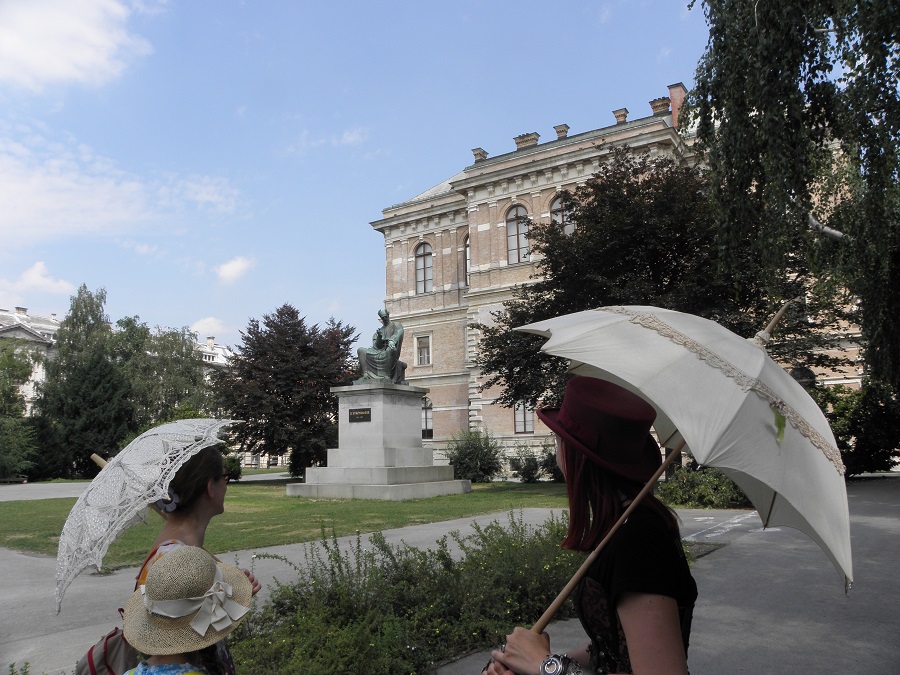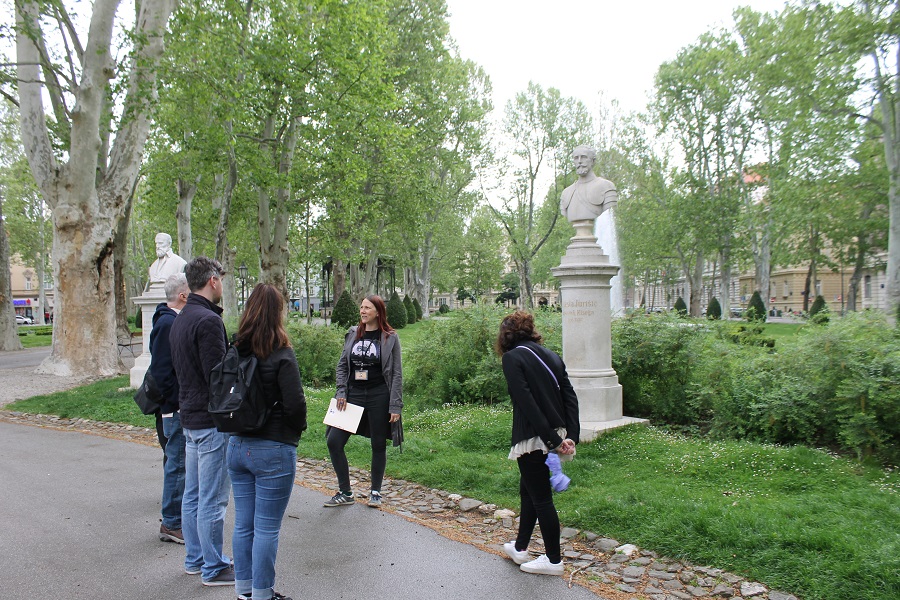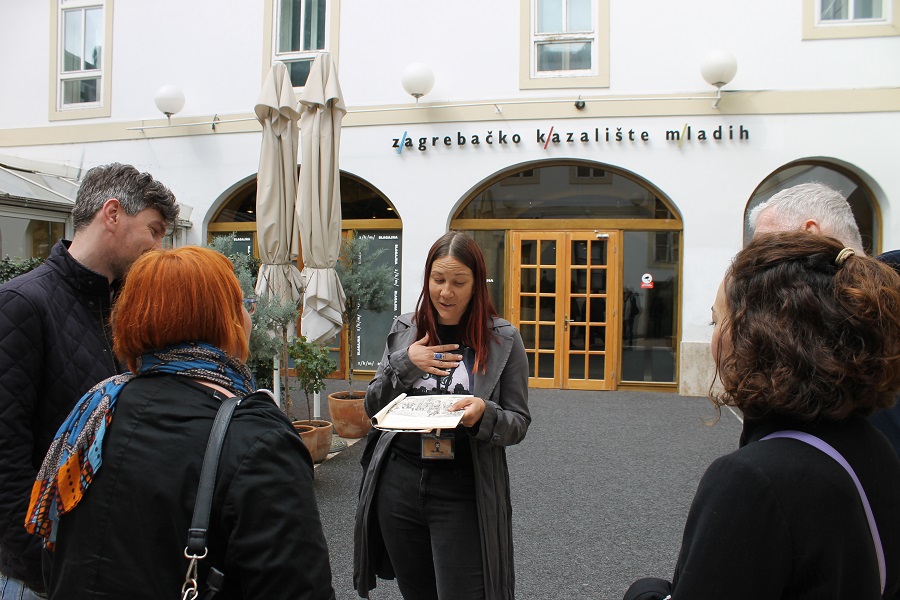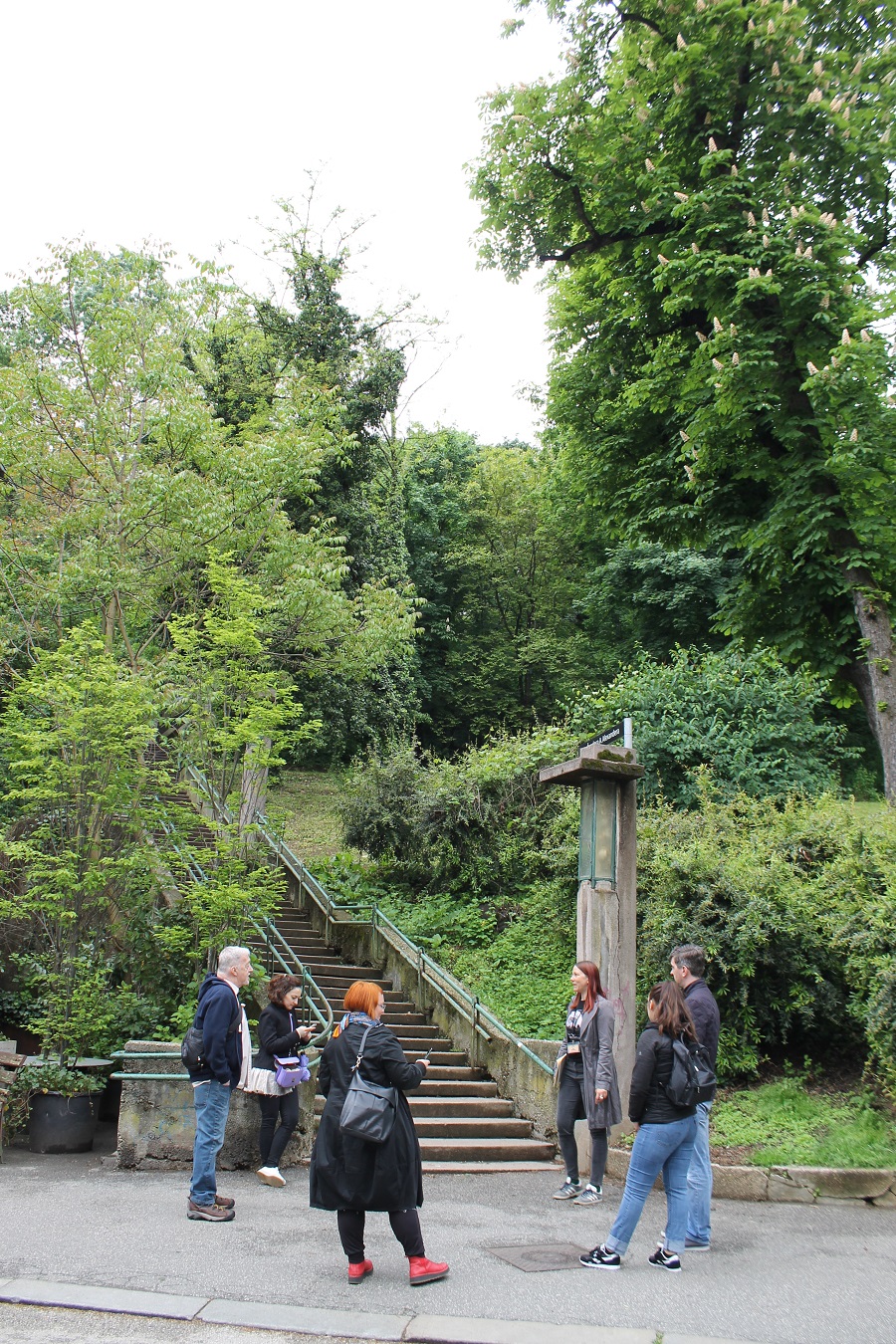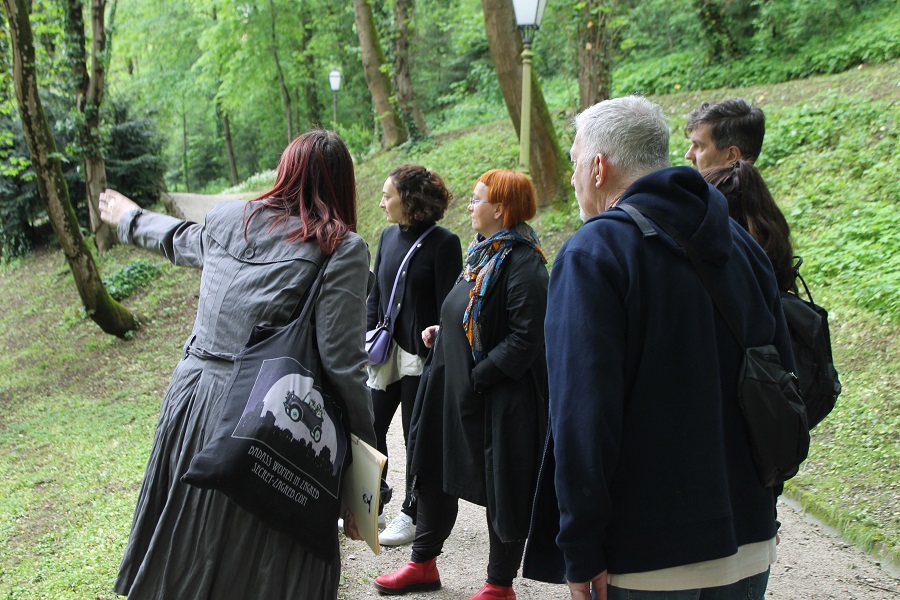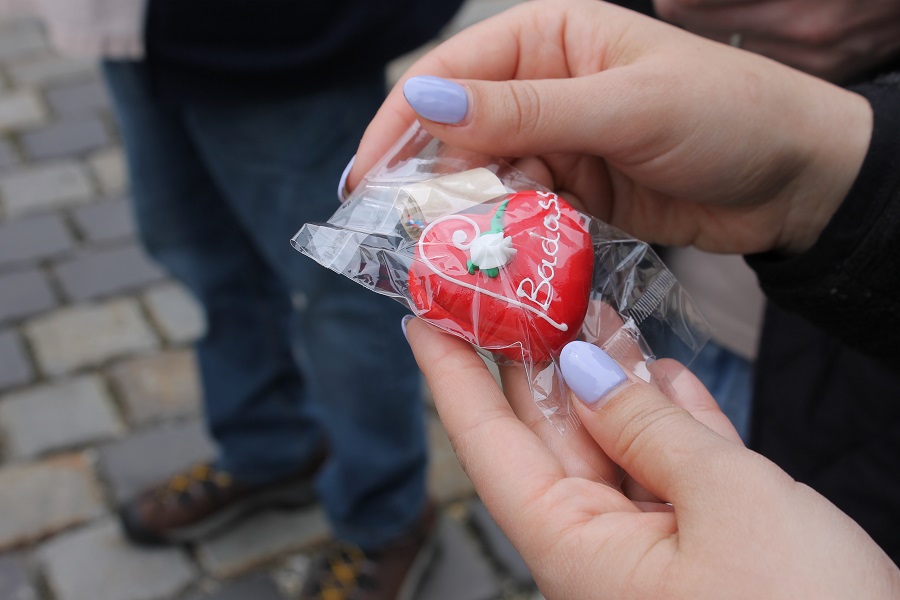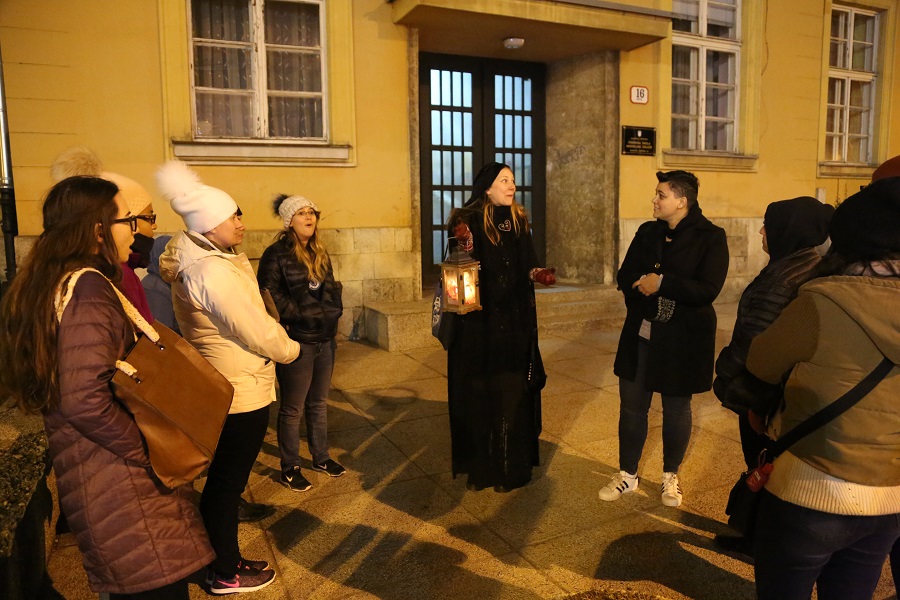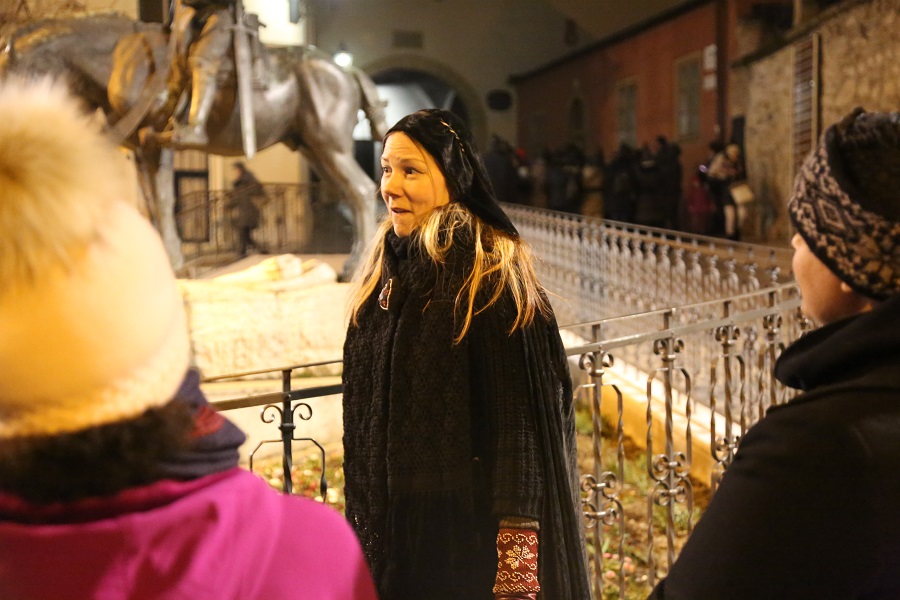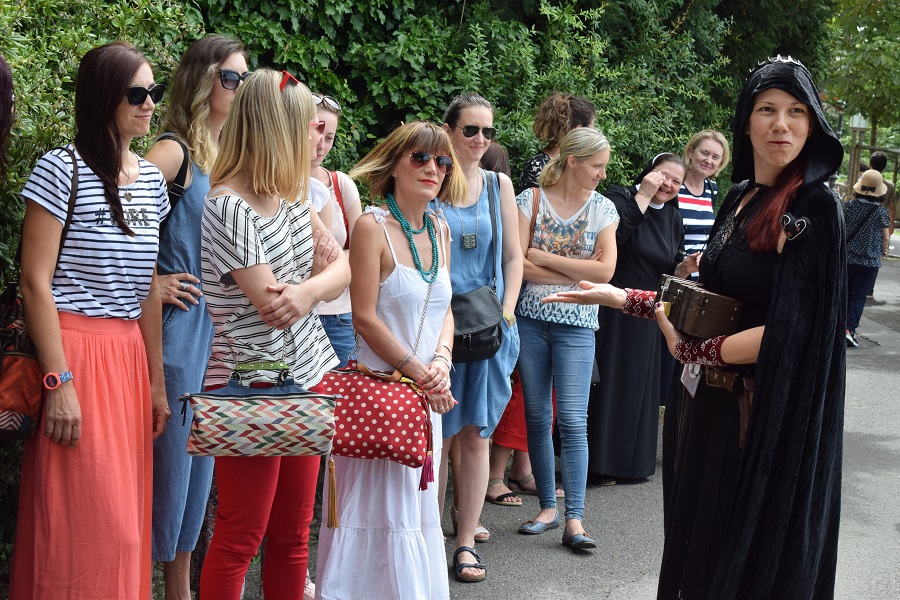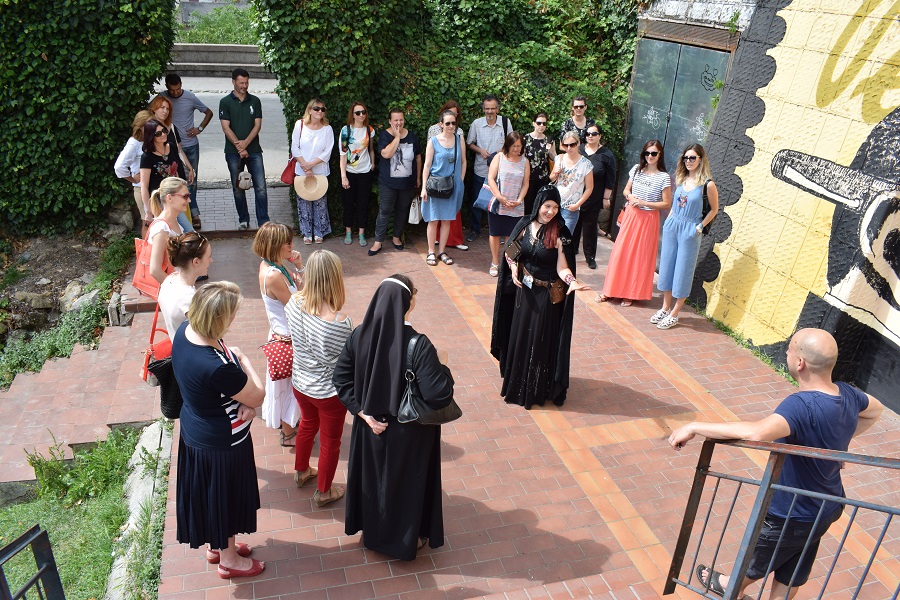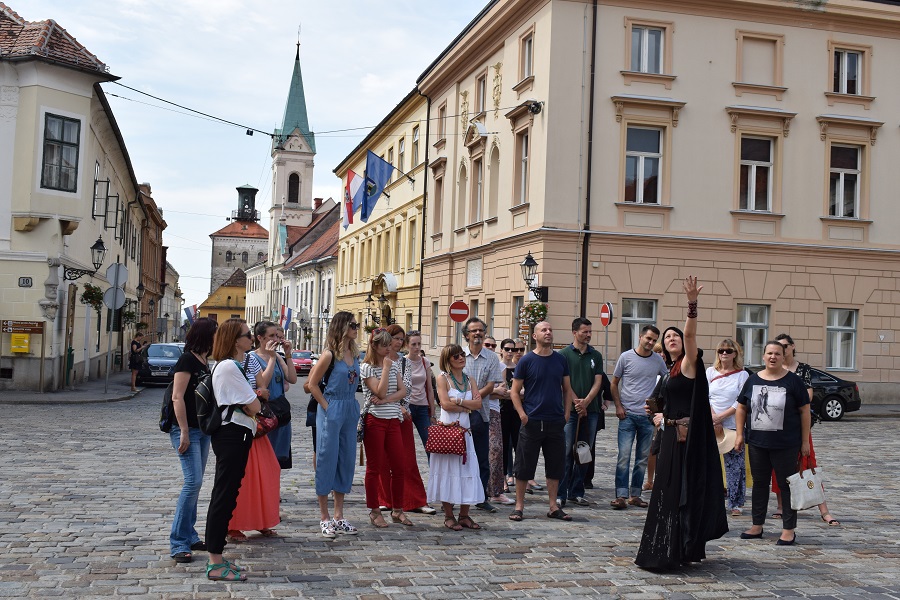Authentic, Innovative Tourism: Iva Silla Creating Magic with Secret Zagreb (Interview)
September 18, 2019 - Authentic, innovative experiences are plentiful in Croatia, but it takes the right person to bring them to life. One of the stars of fabulous tourism content, Iva Silla from Secret Zagreb, tells us a little more.
Zagreb has really come alive, both as a city and a tourist destination in the last ten years. And while Advent in Zagreb has perhaps become the capital's most recognisable brand in recent years, there is plenty to see and do all year round.
One of the pioneers of Zagreb tourism is Iva Silla, whose Secret Zagreb agency did things a little differently from the moment of its inception several years ago, and continues to evolve in new and innovative ways. Iva kindly found some time in her busy schedule to explain to TCN a little more.
I have never told you but you have been a hero of mine for some time with your ability to constantly come up with new and very innovative tours. Tell us a little about Secret Zagreb and how you got started.
Secret Zagreb started as a little blog, and over the years, it has grown into a collection of tours that explore the different faces of Zagreb.
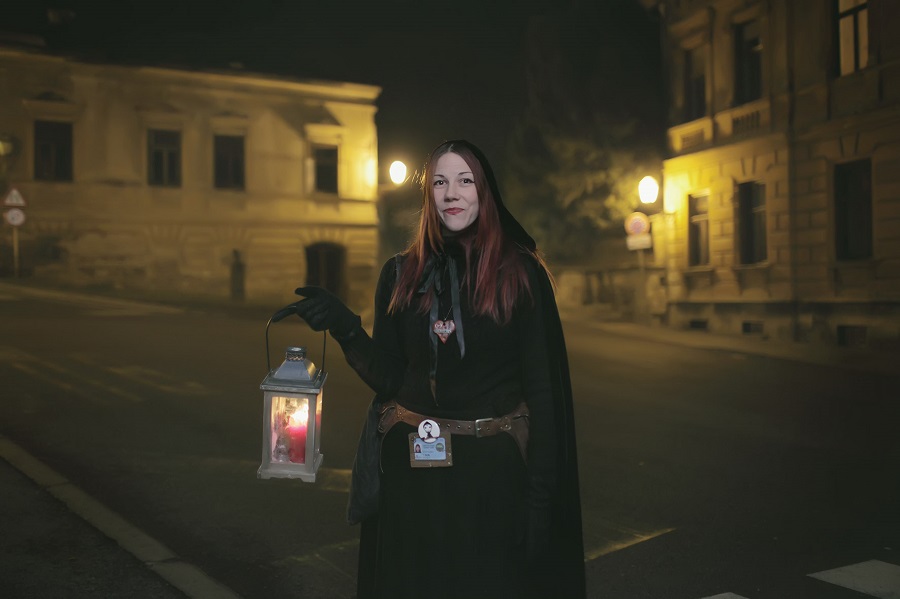
To tell you the truth, in the beginning, I didn’t really have a full picture or a true strategy. I just started off with an idea of a thematic tour and a certain determination. At that time, I wasn’t thinking of any possible obstacles or risks. Even if they occurred to me at times, I successfully ignored such thoughts. Today, I’m grateful for that blissful ignorance. When I look back, I don’t know what got into me, just holding on to a project, focusing on what I needed to make it work.
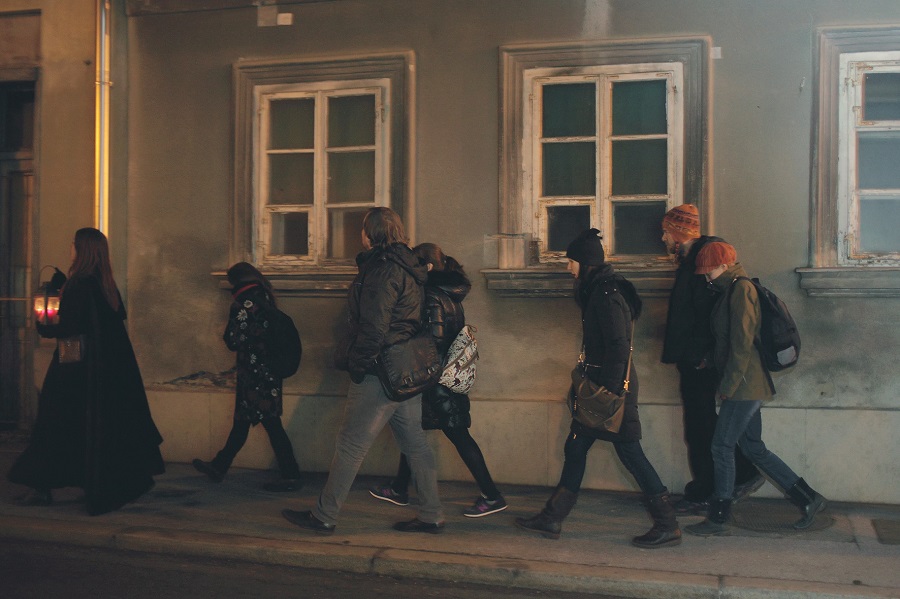
At first, I was observing how thematic tours work in other cities, and tried to figure our why no one really made a living out of thematic tours in Zagreb, even though some interesting tours already existed. At the same time, I wanted to prepare a basis, an online space that could later be used for the promotion and sales of the tours. That’s how I started writing the Secret Zagreb blog, and becoming active on some social media, especially Twitter, which was an amazing tool back then.
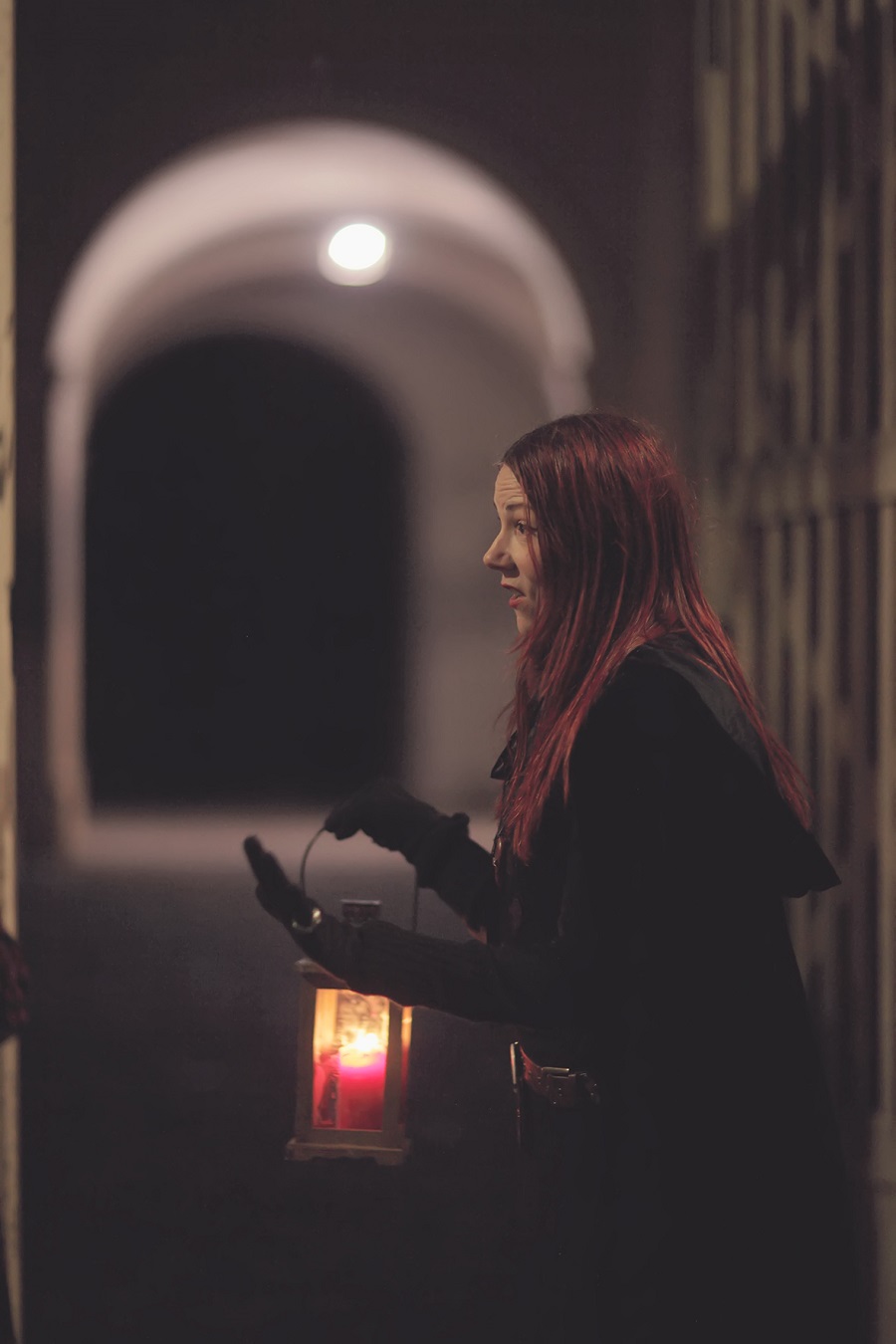
My first idea was to start a dark tour about a particular part of history. I still have some funny sketches from 10 years ago with the stories and the route all set up. While I believed I had the final product, I didn’t have a licence to work as a tour guide. So I went to get all the necessary licences and imagine my surprise when, during the course, I found that another company had just started a tour of that same topic! That tour doesn’t exist anymore, but it was a great lesson even before I started. The first thing I learnt is that I would regret it if I kept setting my creative projects aside. More importantly, that the situation at the market changes fast and unpredictably... and so must I.
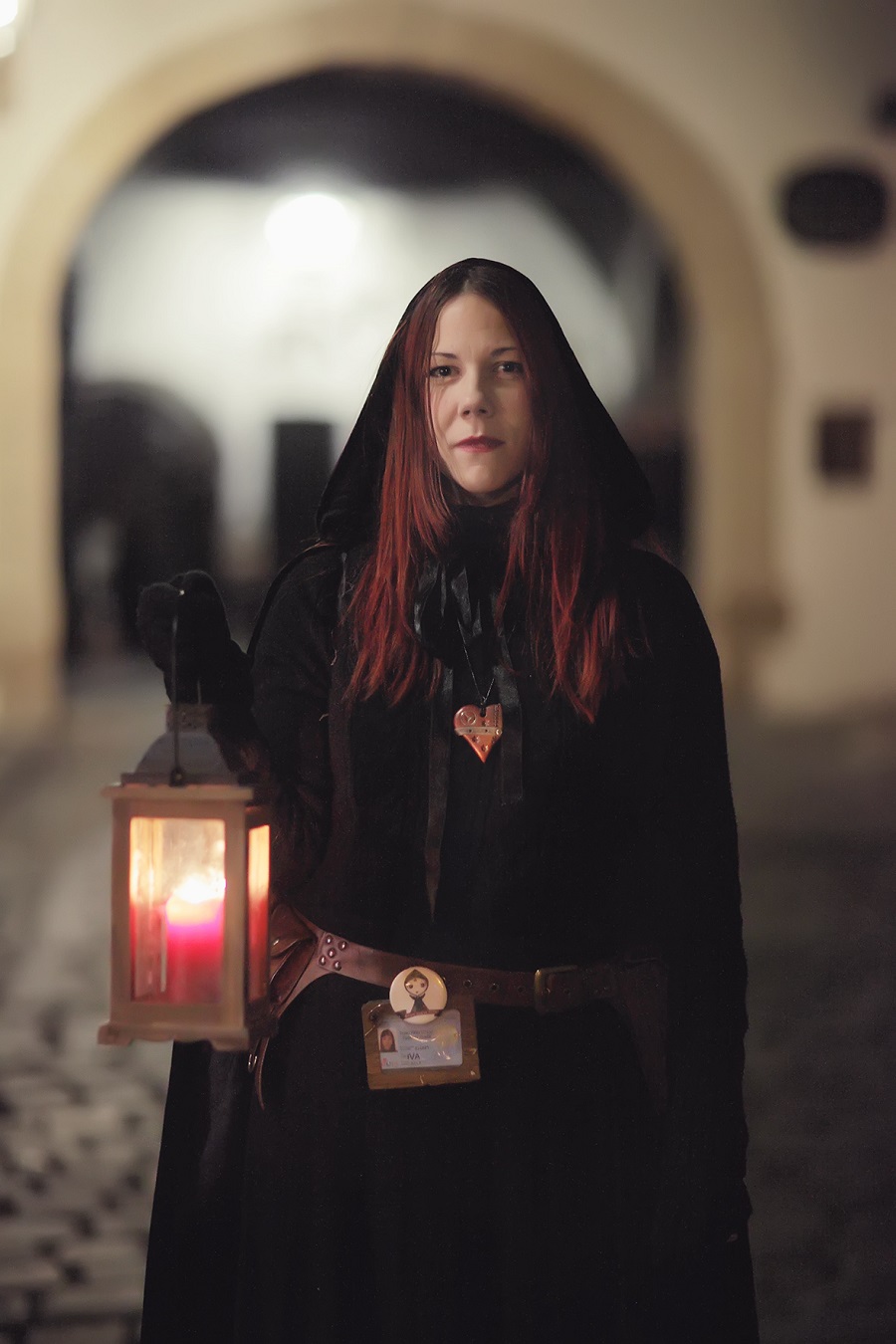
The decision was already in my mind that I was going to start storytelling city tours. I just couldn’t start with something that wouldn’t be original. That’s when I realised that I already have so many stories collected, old legends and spooky tales, that there are patterns in my town, pieces of puzzles just waiting to be put together into a charming whole. So I waved farewell to my first project and started crafting two new magical tours – Sleeping Dragon and Zagreb Ghost Tour (now known as Mysterious Zagreb).
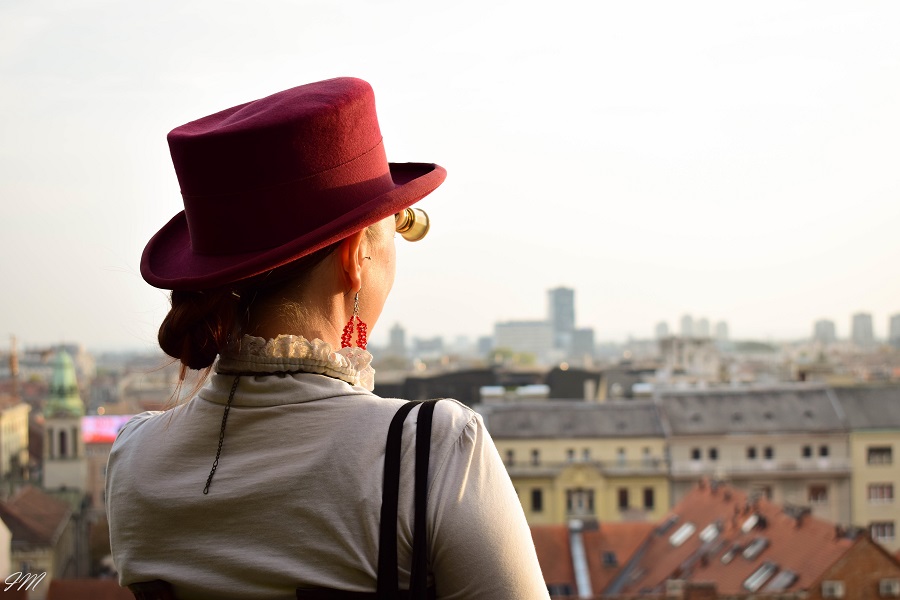
At first, I thought it was going to be a side-project. In the first months, while I was still working on the content for the blog, I realised that wasn’t possible. I needed to dedicate myself to it to make it work. So I did, I quit my job, opened a business and simply started the tours. The first tours were in the month of June. Till the end of that year, I earned around 20.000 kunas gross. This wasn’t really in tune with my original “business plan”, where I assumed it would be easy to have 7 tours a week, times 15 people, times 85 kunas a ticket, which was supposed to be more than 8.000 kn a week. Very realistic to start with, don’t you think? But when I realised that I managed to earn money out of something that’s been there all the time… the stories of my home town and a little spark within... that was so incredibly motivating and it still is. When the first ticket was sold to Barbara, I was out of my mind. It was so surreal.
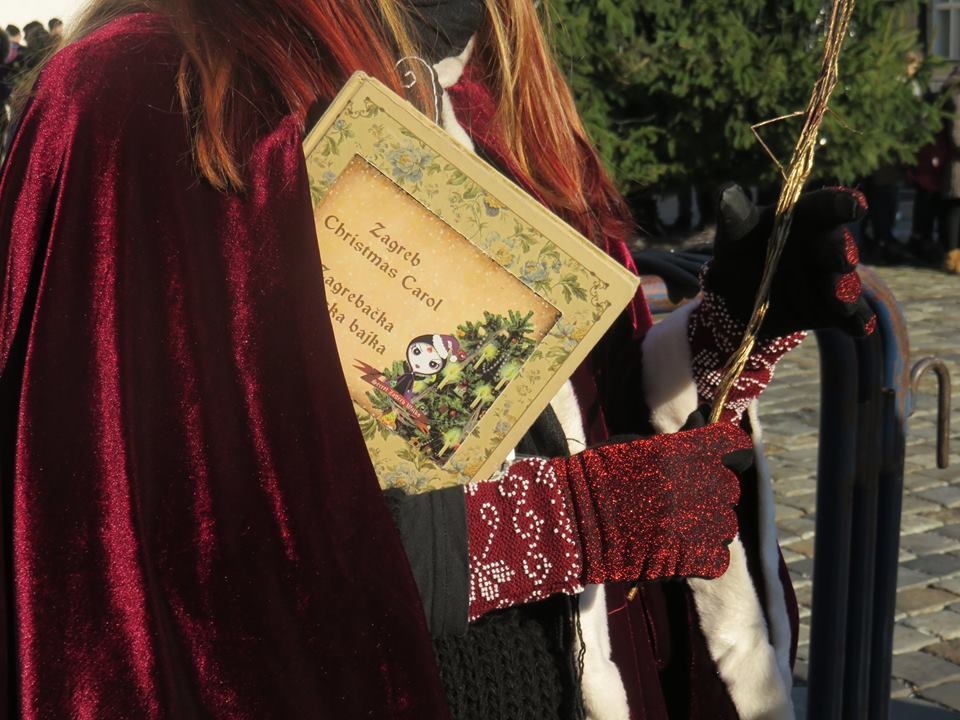
Your tours are a little different to the normal agency. Give us a flavour of what is on offer?
Secret Zagreb started with the mysterious-themed tours, based on local lore, legends and the secretive side of the city. I soon realised that seasonal tours, just as any seasonal event, make a great promotional tool. In the very first year, I already had special Halloween tours and the Zagreb Christmas Carol. The latter was inspired by the Dickens' Christmas Carol and the fact that we just don’t have time to think of the real Christmas spirit. By remembering end-of-year customs, winter troubles and fun times of old, we’re giving a deeper meaning to the Christmas festivities that Zagreb has become famous for. There’s not much going on in Zagreb in February, so I had time to develop a Valentine’s special tour for locals, Dark Romance in Zagreb. Some tours are costumed, all of them are wrapped around a certain topic.
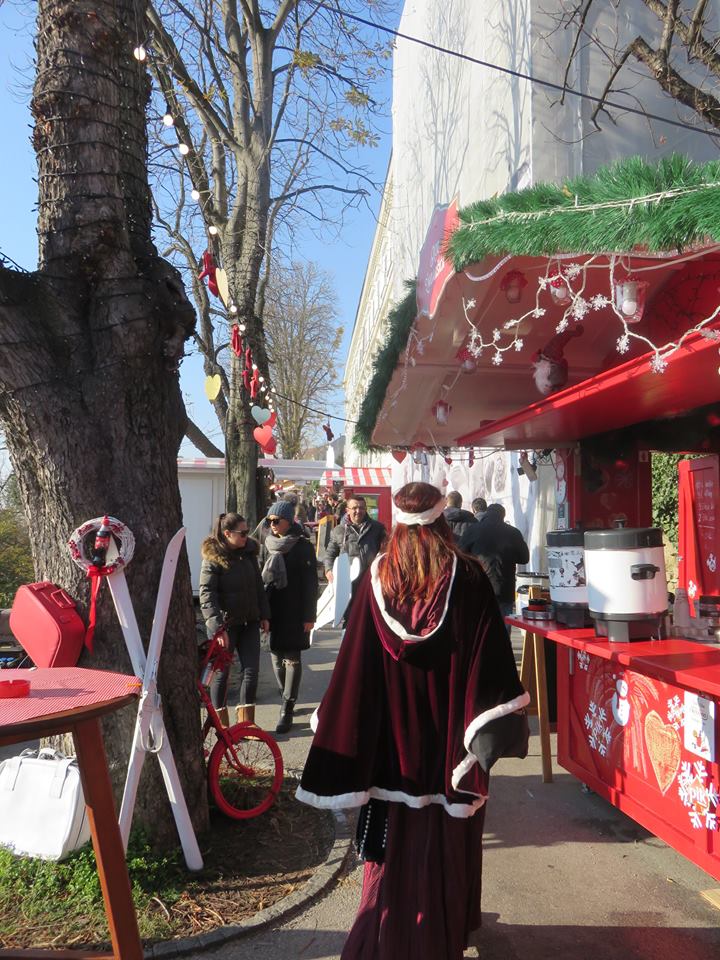
Since 2015, gamified tours came as an innovative addition to the Secret Zagreb offer. It was quite challenging and very fun to set up tours that would combine true history with riddles. They’re different from other gamified activities because they still have a human component – they rely on a guide, who makes the whole thing more entertaining and helps turning carefree fun into a learning experience.
My original intention was to show that Zagreb has so many hidden memories worth sharing. But, the stories that were “secret” when I first started, all of a sudden became part of many other tours. What used to be unexplored seven years ago, is now recommended in every other guide book or app. People started rediscovering the city with the rise of tourism, always searching for new perspectives and locations. Information about Zagreb and its little treasures became more accessible.
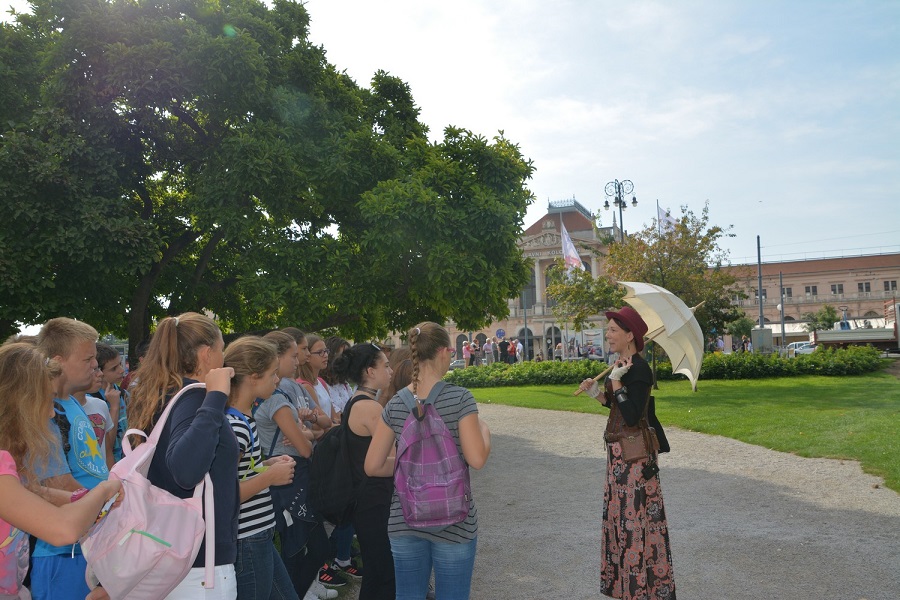
That’s when I started going even further off the beaten track. Not just in terms of stories, but by creating tours with a very unexpected route. The Real City tour or Into The Forest are examples of that. As you can imagine, these are not the most visited tours, but these are the ones where I can really see the transformational effect on the visitors. They find true a connection with the city after wandering in the woods of mount Medvednica, or between the grey buildings of Novi Zagreb.

The latest tour, Badass Women of Zagreb, is currently my favourite one. I wanted to create something meaningful and show that tourism doesn’t need to be all about pure entertainment, that each of us has the power to educate, inspire and to move hearts.
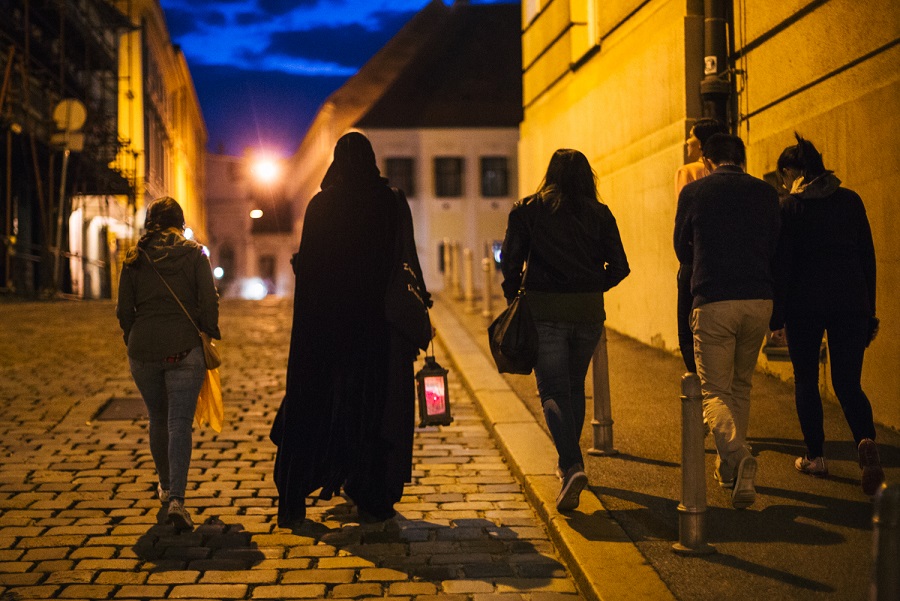
Now I realise that it wasn’t just about expanding the tourism routes, as I believed back then. It was about capturing the spirit of the city and help others appreciate it, not just putting it on sale.
Zagreb is perhaps one of the fastest changing destinations in Croatia, especially with the success of Advent in Zagreb. How would you assess the changes since you started Secret Zagreb/ Are you happy with the current direction of Zagreb tourism?
It has affected me and Secret Zagreb in many ways, yet it was easy to see it coming. Zagreb seems to be going in the exact same direction as many other European capitals and popular city-break destinations, so it hasn’t been very hard to predict what was going to happen.
The number of tourists here is growing, and so is the variety of the offer. Except for the months of January and February, there’s always something happening for us who work in tourism – conferences, school trips, international project meetings… And then Advent, which has become so popular. I’m especially thrilled to see people from other continents coming to Zagreb in December. Even though weekends are the craziest with all the day trips from nearby countries, there are people who travel from far away to enjoy Zagreb at that time of the year.
Another big change that I’ve noticed, is a rise in number of people that stay here for a week or so. I’m really eager to see the statistics for this year to see if what I’ve noticed is true, or just a coincidence. This year, I’ve met so many people who decided to stay in Zagreb for a whole week or more. And they always say they’re here for “only a week”, and they will have to come back.
It seems that the overall attitude still prevails, that the tourists are welcome and even that their increasing number is a great sign of the city’s development. However, local tour guides spend so much time with both tourists and the locals from historical parts of the city. We’re probably the first ones to notice when opinions start clashing. For a few years, I enjoyed hearing lovely comments by the locals. Everything was all roses – we witnessed people getting to know their own town again, being proud of the interest it aroused, enjoying the company of the tourists…. But last Christmas and this summer season, for the first time I started noticing increased annoyance amongst the locals. This is not serious yet, and I hope smart strategies will prevent true irritation from happening. It would be really sad if we weren’t able to turn the knowledge that is out there, from theories to examples of other destinations, into our tool to build a sustainable destination.
I personally believe that the locals have the right to claim their neighbourhoods and their cities. I once read an article about Amsterdam, and one simple thing really hit me: a local resident said that she just couldn’t stand seeing that same tour guide in front of her doorway with the same punchline each day anymore. Gosh, I thought, am I that tour guide? Is Zagreb slowly catching up on Amsterdam? It got me thinking and eventually, I limited the number of the tour participants even more, especially for the night tours that can feel really invasive for the quiet neighbourhoods.
You know that saying “the road to hell is paved with good intentions”. I think it literally describes tourism. Each of us is a little tile that makes the journey to the destination look inviting. Everyone wants to do something good, something valuable. But when you finally get there, you realise we’ve all turned the place into fabricated hell, and have lost its authenticity that used to make it heaven on Earth. Let’s hope this is not going to happen to Zagreb.
I think that’s what makes various urban civil initiatives that are “re-claiming” the city very important. And education of each and every person who is involved in tourism. Too many people are involved, without the awareness about the long-term effects. It’s important to put tourism in the service of heritage, and not the other way around.
Authenticity and experiences are words which are often used in tourism. Do you think Croatian tourism has enough authentic experiences, or is it still over-reliant on the sun and the sea?
I actually believe that the sun and the sea are pretty authentic:) Authenticity is often about the simple stuff with deep meaning. Our incapacity to preserve the simplicity is striking. All we need is to recognise the spirit of destinations and pass that feeling on to our guests. It’s a shame we often lose that feeling in the quick, “easy” and very temporary money.
This will sound really cheesy, but I believe that the authenticity is in our hearts. We can’t make people create authentic experiences if they’re driven by the desire for instant business success. What we could do, is give full support to the ones who keep the authenticity alive and carefully work on developing destinations. All the tourism bodies should work towards that.. I’ve seen what it looks like to have a passionate person with a vision as a head of a small tourism board. We will easily blame the destination management for various faults. However, you have to be a super-human to rise above all the mud that surrounds you, be able to ward off all the opinions that are not in tune with your destination’s strategy, and follow the goals. I don’t think that anyone can be prepared for what awaits for you as a head of a local tourism board, especially if you’re trying to preserve the authenticity. It’s difficult to set heritage and authenticity as a priority even if you’re one of the “rich tourism boards”, because who cares about that when money’s pouring in one way or the other. It’s even more difficult for a small tourism board when they believe that this could actually be the way of development.
With the tours you have put together, you obviously see the opportunities from creating original content tours. How have your clients reacted, and how much more potential is there here to offer authentic experiences?
All I offer is a little shift in perspective in the hope of revealing something that the guests wouldn’t realise themselves. There’s still a lot of potential, but there are also many lost opportunities. It’s hard to offer authenticity when we try to fabricate it. We’re reading about new designer shops, at the same time letting the old artisan shops shut down forever under the radar. We’re talking about the “new creative awakening” of Zagreb, completely ignoring the city’s history of creativity, serious art movements, not even noticing that we’re slowly losing the tradition of social engagement. It’s so hard to keep our focus even here in the capital, where there should be most opportunities. I’m the first one to fail here. I have the desire to promote some special pieces of the town’s memory, but I don’t always succeed in delivering it to the market as I’d love to.
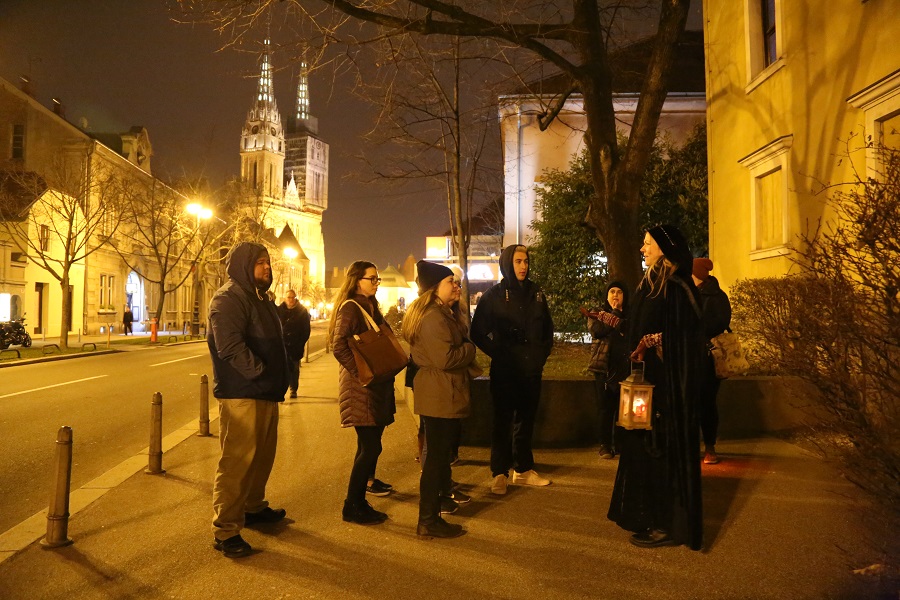
Right now, on TripAdvisor, there are 190 tours listed for Zagreb. That’s a lot, and it’s hard to dig through all that and discover what’s truly authentic. However, I think there’s still space for new tales, it’s just the matter of finding your way to the market. Airbnb Experiences could be a good platform to offer something new. There are some very unexpected creative experiences offered there.
A few years ago at a Zagreb conference, you showed a wonderful video of a Belgian pig walking tour as an example of innovative tourism using the traditions of the location. Can you give us a few examples (not your own agency) of similar things that you have seen in Croatia?
Innoguide Experiential BE from Copper Views on Vimeo.
Haha, the pig tour was so revealing for me, too. The point is, not everyone will come to my village. But my village doesn’t have the capacity for everyone. People who do come, on the other hand, will be able to experience something very authentic. There are so many good examples throughout Croatia, I’m going to give a few that I’m personally familiar with.
Just a few weeks ago, an enthusiast Tihomir Želimorski organised an event called “Šetnja kroz naivu” with the support of Central Podravina tourism board in a village of Hlebine. Soon enough, the whole community joined - many households participated one way or another, helping the visitors understand that art is a part of who they are. This is a wonderful start of something that could turn into a true art destination in the future. I’m personally so enchanted with Podravina right now, that I can’t help it but mention at least one example from that region.
An amazing example of heritage, community and tourism, working together, is an event called Tunafest in Bakar, organised by the Bakar Tourism Board and Via Mea agency. So many locals – producers, performers, folk associations, business owners, get together to put up a very authentic event for big organised groups of tourists.
I really admire Jelena Holenko of Lynx and Fox, who is doing such an amazing job with her tours in the region of Gorski Kotar. Through her passionate work on social media, I feel she is the single force that’s directing the attention to her destination. We’ve met less than a year ago and we already had a chance to work together on some educational projects. But I remember first noticing her online, thinking “What is this? Self-destruction next level:)” It must be so difficult to reroute people to come to Gorski Kotar, and what an organisational task it must be to set up each of her tours. When anyone of us, who works to keep the local heritage alive, feels down and not sure about what we’re doing, just one click on Lynx and Fox, and we find Jelena, bursting with energy, creating connections throughout her region, her desire to make us come and visit every single incredible sight, and meet every single person who works hard to keep a part of heritage alive - that’s pure inspiration and a drive for all of us.
I also love Culsperience project that clearly points fingers to what’s really authentic. I appreciate that it’s focused on continental Croatia.
An Istrian town of Savičenta is an example of passion and focus growing big and community working together towards greatness. It took time, and it’s still an ongoing process, but for years, this small town has been developing around the identity they agreed on. If a place of a few hundred residents is becoming a sustainable destination, it wouldn’t hurt if every small city council meeting should start with presentation of that example.
These are just a few tiny examples, I deliberately picked different kinds to show the variety. I’ve had the privilege to meet so many inspiring people who care. I met passionate guides from Šibenik whose eyes literally start shining with pride when they speak about their home. Or warm heritage interpreters from Istria who keep the lost languages alive.
Artists, tour guides, reenactors, tourism board and local authorities employees, vendors, farmers, artisans, designers, promotors, journalists, food producers, taxi-drivers, captains, museum curators, park rangers, to name just a few…. there are so many beautiful dreamers eager to stay here in Croatia and make visitors feel at home, too. Most of them are desperately trying to build a life around that passion, but too often, after years of trying, they eventually have to wake up because the big majority and a big part of the system are not supportive enough and don’t have the same priorities. But there is a silent army of incredible people growing stronger, rising deep under the superficial layers of concrete and big tourist numbers, and when it bursts through, it’s bringing the heart of the country back to the surface, all the breath-taking treasures and heart-warming gems ready to explore.
Are the needs and wishes of tourists changing in recent years? What advice would you have for someone thinking of opening a tourism agency in Zagreb?
They are changing so fast. You just can’t stand still and have to keep moving and planning new things. I think, just like in any business, it’s important to have some kind of a higher personal goal. And your own Barbara – the person who bought your first ticket. Mark down those tiny moments of gratefulness so you can go back to them.
Otherwise, the energy level is going to drop eventually and you won’t be able to stay in touch with yourself. My little trick to keep myself going is to keep my sight clear. Is there anything I will regret if I don’t try it? If there is, you can be sure that I’m working on it right now. There is a book by the genius Nela Dunato – The Human Centered Brand – if you’re ever in doubt where you’re going, this piece of wisdom will take you back on track.
As for the ongoing projects – keep track on the market, in your town, country, and similar destinations and projects abroad; react to changes as soon as they start happening if you were not able to predict them earlier.
I like to simplify things in my head, so when I need to double-check what I’m doing, I think of it in terms of tattoos. Would I like to have my project logo tattooed on my skin, so I can explain to everyone what does it mean to me? If it feels more like a faded teenage tattoo ready to go under laser, it’s time to turn pages.
Tourists’ expectations keep changing, too. There is a rise of “experiences” all over the world, and many tourists simply expect to be entertained and ovewhelmed with fast experiences, they are not on a quest for a more profound connection. It happened to me that I needed to change who I was aiming at as clients. It used to be anyone, because anyone who came to Zagreb was already off the path and interested in deeper exploring. But with the rise in numbers, I have to start being more focused in marketing, at the same time “fighting” for my desired clients with the increased number of tours in the city. It’s an ongoing process.
People usually start with one idea and they have a feeling once it’s out there, the job will be done. But that’s just the start.
Since none of us is prepared for the market that changes so quickly, especially if we’re working in a creative field where your own product is an innovation so you can’t really predict anything, we all require more life-long education opportunities and some kinds of vanity-free hubs that will give us a chance to create collaborative atmosphere.
Collaboration is another important thing that I haven’t even mentioned yet. Working together, creating something in teams, learning from each other, exchanging experiences - even for great individualists, this can be truly transforming, and of course, very important for the community. I have to mention the association of tour guides Mihovil from Šibenik - some very strong and charismatic personalities put all their differences aside and got together to create a walking tour called “Mračna strana Šibenika” and many other projects that depended on their collaboration and mutual support. That’s other-wordly, an example that we should all strive to.
I have personally had the pleasure to collaborate with so many people through all these years. Sometimes it was successful, sometimes not. But, each and every one of them has left a mark and made a significant difference. We need to be ready to accept other people’s opinion, ready for failure, just as we are for success, take the best out of it all, keep moving and creating. Cherish the beautiful moments and just be true to ourselves and the destinations we’re breathing life into.
You can learn more about Iva's incredible tours on her Secret Zagreb website.
Croatia Airlines Celebrates 30th Birthday in Zagreb
September 18, 2019 - Croatia Airlines, Croatia's national air carrier, and a Star Alliance member, celebrated its 30th anniversary in Zagreb
T.portal reports that at the commemorative ceremony, held at the company's technical center at Zagreb Airport, was attended by Croatian Prime Minister Andrej Plenkovic, envoy of the President of the Republic of Croatia and Minister of Maritime Affairs, Transport and Infrastructure Oleg Butkovic, senior political representatives, Star Alliance Executive Director Jeffrey Goh, international representatives of airlines and organizations, many business partners of the company from Croatia and abroad, and employees of the company headed by CEO Jasmin Bajic.
Prime Minister Plenkovic addressed the many guests, announcing a financial injection for the national air carrier. "On Thursday, the Government will decide to recapitalize Croatia Airlines," Plenkovic said, but did not specify the details.
In his address to the attendees, the head of Croatia Airlines recalled that the history of the Croatia Airlines began on August 7, 1989, as Zagreb Airlines d.d. (Zagal), an air transport company. Zagal started operations in December of the same year providing postal services, and on July 23, 1990, changed its name to Croatia Airlines d.d., becoming the national airline for the transportation of passengers, goods, and mail.
Passenger transport began on May 5, 1991, when the first domestic flight on the Zagreb - Split route was made using the rented MD-82 aircraft. A year later, on April 5, 1992, the company also made its first international flight (Zagreb - Frankfurt), which began connecting Croatia with Europe and the world.
"Thanks to the expertise and diligence of our employees, we have achieved many business successes over the past thirty years, while continuously expanding our worldwide market presence," said Jasmin Bajic, CEO of Croatia Airlines, adding: "We are proud that travelers recognize us for their flight safety, professional staff and quality of service, and that we have been creating memories for three decades now.”
In the 30 years, Croatia Airlines has grown into a mid-sized airline in Europe, during which time it became a member of major aviation associations such as the International Air Transport Association (IATA) and Star Alliance, the world's largest global airline alliance.
As a national air carrier, the company makes an essential contribution to the development of Croatian tourism as it enables the year-round connectivity of Croatian destinations and Croatia with the world. Almost one-third of all tourists come to Croatia using Croatia Airlines aircraft annually, and the company is the fifth largest exporter in the Republic of Croatia.
“I take this opportunity to congratulate Croatia Airlines on its 30th anniversary, but also, from the bottom of my heart, thank them for 15 years of loyalty to the Star Alliance. Croatia Airlines has made Star Alliance an important presence in Southeastern Europe and has made a significant contribution to the implementation of joint initiatives to improve the customer experience, and we look forward to an even longer collaboration in the future,” said Jeffrey Goh of Star Alliance.
Leading Croatian fashion and textile company Varteks, with the support of Croatia Airlines, designed a special gift for the birthday celebration. Thus, the Croatian fashion giant created a proposal for the future uniforms of the pilots and cabin crew, which were presented at the birthday celebration. Vartek’s vision of the national airline's uniforms was worn by company staff, who, for this occasion, jumped into the role of models and walked the catwalk.
Since its first commercial flight to date, Croatia Airlines has achieved more than 600,000 flights and carried nearly 40,000,000 passengers.
This season, Croatia Airlines planes will fly directly to 38 destinations, 30 of which are international and eight domestic, connecting Croatia with 24 European countries.
The Croatia Airlines fleet consists of twelve aircraft: four A319 Airbuses, two Airbus 320s, and six Dash 8-Q400 turboprops.
To read more about travel in Croatia, follow TCN’s dedicated page.
Zagreb Gears Up for Chemical Brothers Spectacle at Dom Sportova
September 18, 2019 - We are less than a month away from the Chemical Brothers spectacle at Dom Sportova, a concert that will bring back world-class content to one of the biggest stages in Zagreb.
The Chemical Brothers are coming to Zagreb at the time of their greatest maturity; with a new concert tour and impressive new visuals. Tom Rowland and Ed Simons visit Zagreb as the frontrunners of British electronic sound, and the co-creators of the successful big beat and its breakthrough into the orbit of pop culture. They released their current album 'No Geography' this year, marking the global festival season as the headliners on some of the world’s biggest stages - from Glastonbury to Fuji Rock.
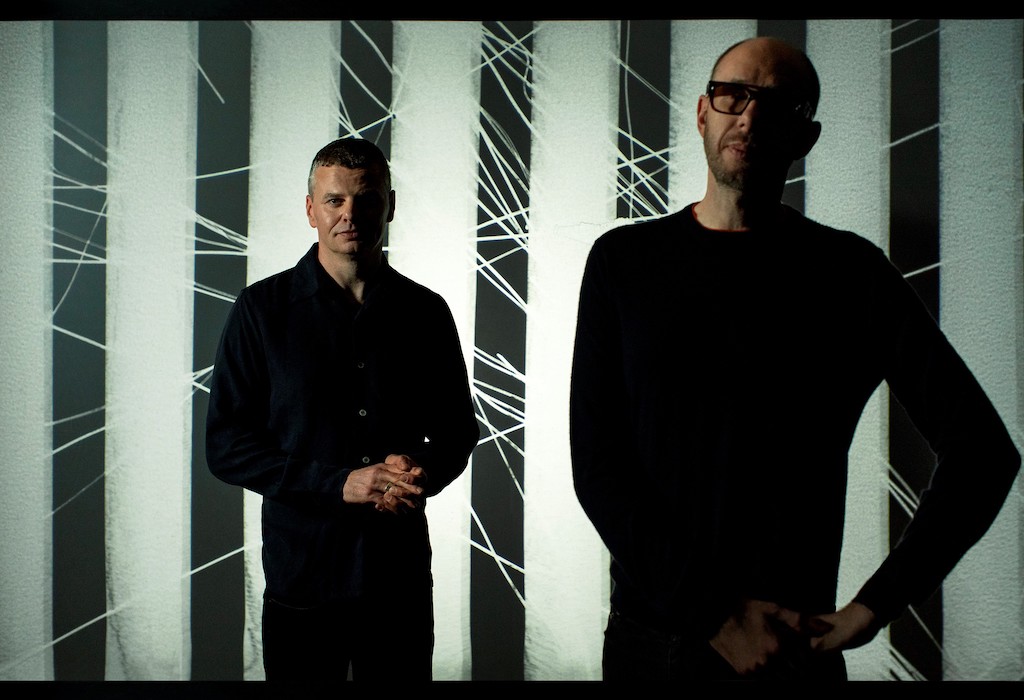
Hamish Brown
The British big beat duo has released 24 albums throughout their career, including nine studio records, one live album, five compilations, two remix albums, five mixed albums, and one soundtrack. Six albums finished in the top of the UK charts, and three records were named platinum.
Zagreb's Dom Sportova will witness a galaxy of hits, with one recognizable song after the next. Among the electro-music classics are 'Hey Boy Hey Girl', 'Come with Us', 'Galvanize', 'Do It Again', 'Go', 'Star Guitar' and 'Wide Open', and new hit singles 'Free Yourself' and 'Eve of Destruction'.
The British duo's performances bring pure hedonism, combining large video screens, psychedelic images, and expressive light shows with strobes and lasers. It is reminiscent of an exciting thriller, which completely captures the attention of your senses. The Chemical Brothers are considered one of the most interesting live performers in history.
The visual aesthetics are one of the characteristics that accompany Tom and Ed throughout their creative work. The videos are filled with metaphors, illustrations, symbolism, and rotating video solutions, which makes it similar to live performances. "We have one of the most natural approaches to the stage," Ed Simons pointed out, "the show is very psychedelic; we care about how we convey the stimuli and messages we bring to our visuals."
The Chemical Brothers are primarily remembered for their collaborations, like using Oasis singer Liam Gallagher for the song 'Setting Sun', Beck in the single 'Eide Open', Q-Tip in the hit 'Galvanize' and Bernard Sumner in the theme 'Out of Control'. Other notable collabs include Kele Okereke ('Believe'), Beth Orton ('Alive Alone'), The Flaming Lips ('The Golden Path'), Willy Mason ('No Path to Follow'), St. Vincent ('Under Neon Lights'), Hope Sandoval ('Asleep from Day') and Richard Ashcroft ('The Test').
Although the Chemical Brothers are no stranger to playing in Croatia, this will be their first major solo show in the Croatian capital. Unlike their appearances at festivals, the Chemical Brothers solo show is a complete set of the duo’s most successful songs, allowing them to experiment and place total focus on their repertoire from all stages of their career.
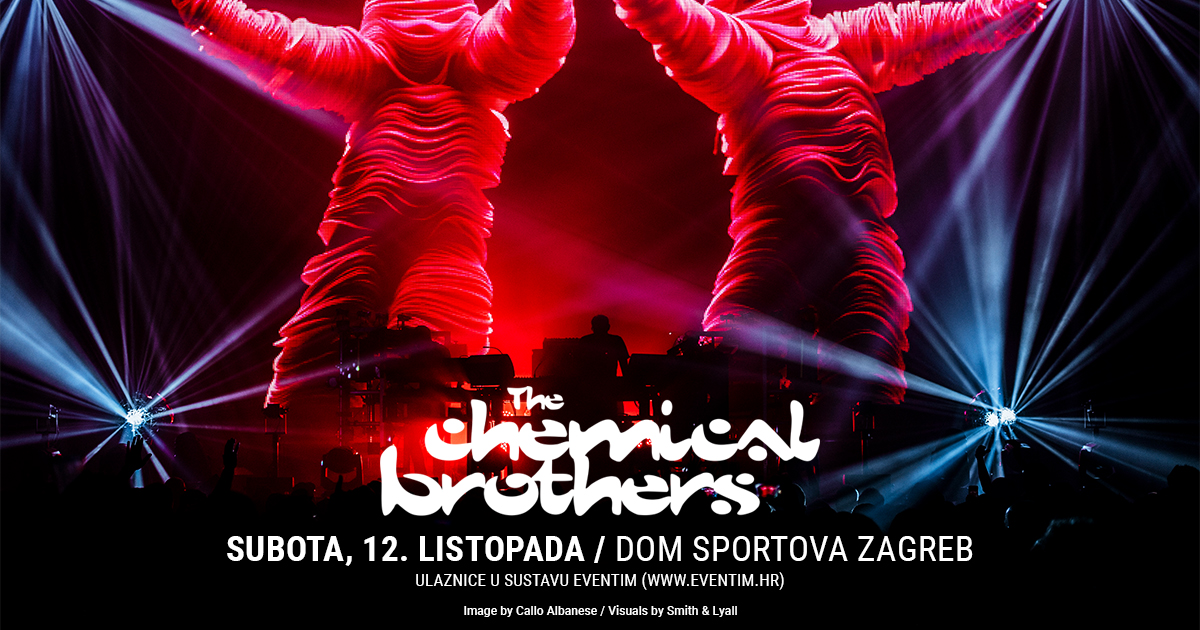
A Chemical Brothers show ensures you escape from reality and plunge into your imagination, and this concert at Dom Sportova in Zagreb promises nothing less.
You can see the Chemical Brothers debut in Zagreb on October 12th.
Tickets are available here.
To read more about lifestyle in Croatia, follow TCN’s dedicated page.
VIDEO: Zagreb Wine Story Wins 3rd Place at Wine Spectator International Competition
September 17, 2019 - Winetastic Path Home, a story about Zagreb's wine country, wins 3rd place in Wine Spectator's 2019 Video Contest.
HRTurizam writes that Wine Spectator is the most circulated wine magazine in the world, and a feature in it is imperative of every wine destination and winemaker.
Thus, Wine Spectator held a Video Contest for the 13th year in a row to promote wine destinations - and one Croatian destination’s wine story received the first international video production award for wine in Croatia.
Specifically, the video Winetastic Path Home, produced by Sekunde Digital, a specialized marketing agency in wine and tourism, won 3rd place for their Zagreb wine story, and more importantly, much attention in the US market. This is the first time in the 13 years of the Video Contest that Croatia was awarded.
The short video, which takes the viewer through the dynamic wine scene of Zagreb and the nearby vineyards, was shot in collaboration with the Zagreb Tourist Board. That this is a significant promotion is evidenced by the fact that the digital edition of this reputable magazine focusing on wines & lifestyle is visited by 1.1 million readers a month, and interestingly, just advertising in such a publication is much higher than investing in video production.
The Zagreb-based agency says:
“We have encountered a number of difficulties in trying to convey to the winemakers the potential of video collaboration and the importance of consultation throughout the process. We decided to show them what they could do. No winemaker from Croatia has ever entered this international competition. There was no one to advise them, and we are working to help them and to change that together. It is very easy to record a promo video that you will only post once. It is very difficult to find a production partner who will suggest that you use video footage, use it for different purposes and think outside the box. We are very grateful for the cooperation with the Zagreb Tourist Board, which recognized the potential of such video collaborations,” points out Martina Milicevic of Sekunde Digital.
Otherwise, Zagreb is the hometown of this sommelier with a WSET L3 degree and the founder of Sekunde Digital agency, but also probably a lesser-known wine destination for wine lovers coming to Croatia.
As Milicevic points out, the idea behind the project was to show how little we need to escape from the metropolis to a world of wine. Even if you aren’t a wine enthusiast, every wine road in Zagreb County offers many facilities and truly enchanting nature.
The idea to promote Zagreb at Wine Spectator is the result of a collaboration between the tourism board and Sekunde Digital, an agency that specializes in the two domains, tourism and wine-gastronomy. The competition for winemakers is demanding, many US wineries use video in their strategies, but few destinations use wine stories for this type of promotion.
If we add that the average American tourist in Croatia spends twice as much, almost 160 euros a day, this is a great way to communicate with the target market. And there is hardly any competition, as most of the stories are focused on the wineries and stories of their founders
“The highlight of this competition and many other promotions is always the story. Solo, nice shots are often lost in the sea of promotional videos we look at daily. The story remains. If we include a strong message in the video production that we want to send, find credible people who can convey it, and find a channel on which it can be transmitted, there is a great chance of success. And communication is the basis of any good promotion. If you start with people, then you're a good promoter,” concludes Milicevic.
You can see the award-winning video below.
To read more about travel in Croatia, follow TCN's dedicated page.
Flights to Croatia: Korean Air Reduces Winter Capacity, Smartwings Boosts Split Service
September 16, 2019 - The latest news from around Croatia’s airports for new flights to Croatia with updates from Zagreb and Split.
Avio Radar reports that Korean national carrier Korean Air, a member of the SkyTeam Airline Alliance, will reduce aircraft capacity slightly on its route between Seoul (Incheon Airport) and Zagreb in the coming winter flight schedule.
Thus, instead of the new and larger Boeing 787-7 Dreamliner aircraft, which flew last winter and this summer, the upcoming winter season will feature the Airbus A330-200, which has the capacity for 218 passengers. The winter schedule will run from November 2019 to March 2020.
Additionally, Korean Air will continue to operate on the Seoul-Zagreb-Zurich-Seoul route this winter.
Moving from the capital to the coast, Avio Radar also reports that Czech carrier Smartwings will increase operations on their service between Poland and Split for the 2020 summer season. Namely, the airline will run three flights per week on both lines - Warsaw (Frederic Chopin Airport) and Split-Katowice.
In addition to this year’s one flight per week, which took off on Thursdays, two flights have been added per week on both routes - on Mondays and Saturdays. These new lines will begin working on May 25, 2020. The end of traffic on these routes is still unknown, though tickets are currently on sale until September 7, 2020. Smartwings will operate both routes using a Boeing 737-800 aircraft.
Recall, TCN recently reported that national carrier Croatia Airlines would add a one flight per week between Brussels and Zagreb this winter, totaling to 12 per week. Furthermore, the seasonal service between Zagreb and Dublin will work until January 26, 2020, while its operations between Zagreb and Lisbon will end at the end of October.
Croatia Airlines will maintain the same winter operations for other Croatian cities this year, which include flights from Split to Frankfurt, Munich and Rome, Dubrovnik to Frankfurt, and Rijeka to Munich. Croatia Airlines has also announced no changes to its winter operations between Croatian locations.
To read more about travel in Croatia, follow TCN’s dedicated page.
Croatia 2.0 Cloaked in Positivity at Entrepreneurial Mindset Conference in Zagreb
Some of Croatia's most successful entrepreneurs gathered in Zagreb on September 12, 2019 for the first Entrepreneurial Mindset conference. It was quite a day.
About 18 months ago, I met entrepreneur Nenad Bakic for a coffee in Varazdin. During the discussion, he told me that he had decided he wanted to show me something interesting, a different view of Croatia that would surprise and inspire me.
And so it proved. A few days later, I found myself in a room with 300 people from the top of the emerging Croatian entrepreneurial class at the EY Entrepreneur of the Year dinner in Zagreb. It was probably the most positive atmosphere I have experienced during my time in Croatia, And there was only going to be one winner, man of the moment, Mate Rimac.
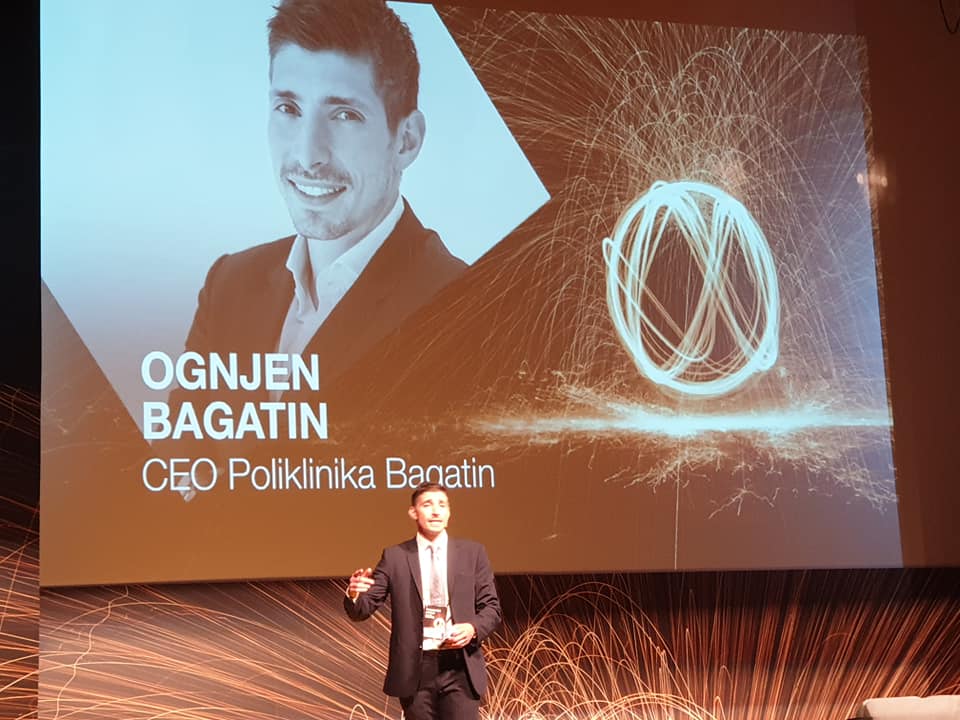
I started to look into this new breed of Croat - entrepreneurs setting up businesses in a society which was deeply embedded in the socialist mentality. And the more I looked, the more I realised that this was the most exciting story to be told in Croatia today, and not tourism. Outstanding individuals and proud Croats, forging their way onto global markets despite the overwhelming bureaucracy and negative perception of the entrepreneur in their home country.
And the more I looked, the more I was astounded by the levels of Croatia excellence on the global stage. It was not just Rimac, but many IT companies and medical tourism clinics, for example. One of the driving forces for positive change and Croatia 2.0 is Ognjen Bagatin, CEO of the hugely successful Bagatin Clinic in Zagreb and Split, as well as the man spearheading Croatia's medical tourism expansion, and also strengthening business contacts between Croatian business and its diaspora.
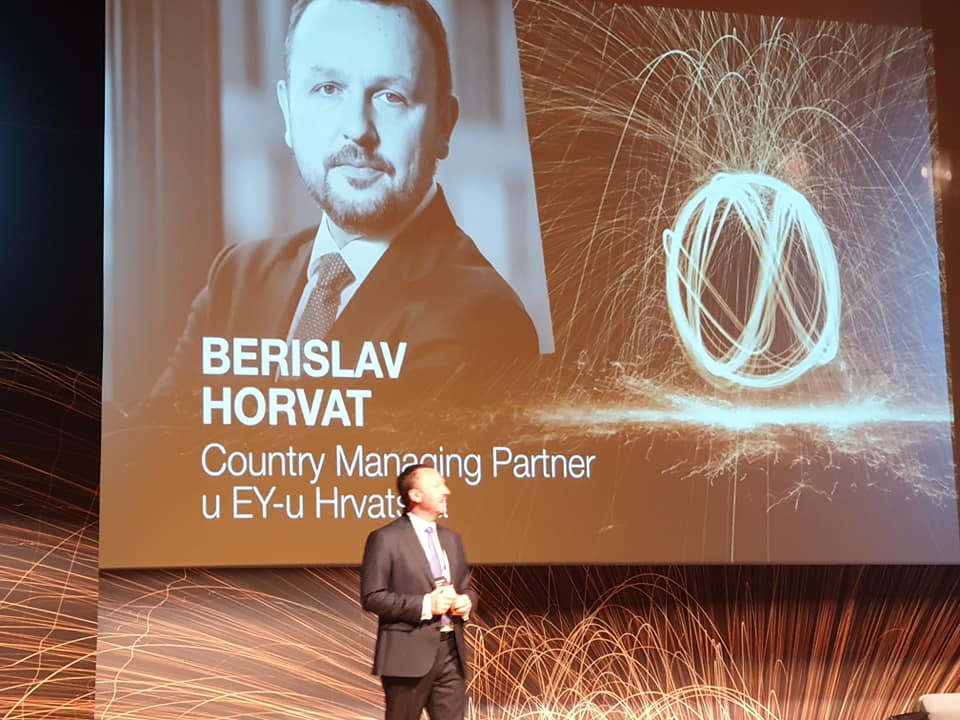
It was no surprise to learn that he and his Casopis Poduzetnik magazine was being a new conference for Croatian business - the Entrepreneurial Mindset - in partnership with EY as an extension of their successful Entrepreneur of the Year evening in March.
Both Bagatin and EY Managing Partner for Croatia, Berislav Horvat, welcomed participants to the one-day conference, which took place at the Zagreb Academy for Music.
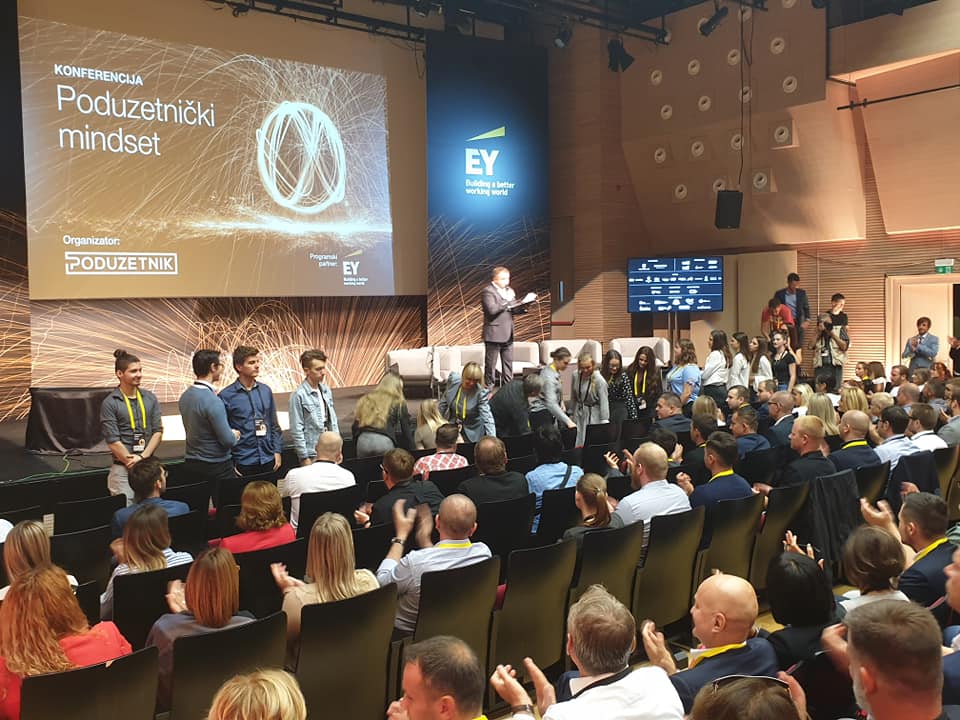
Although there was a rich lineup of distinguished speakers, the front row was reserved for the entrepreneurs of the future, some of Croatia's brightest youth who had won entrepreneurial awards and the right to take their seats in the audience. A nice and inspiring touch.
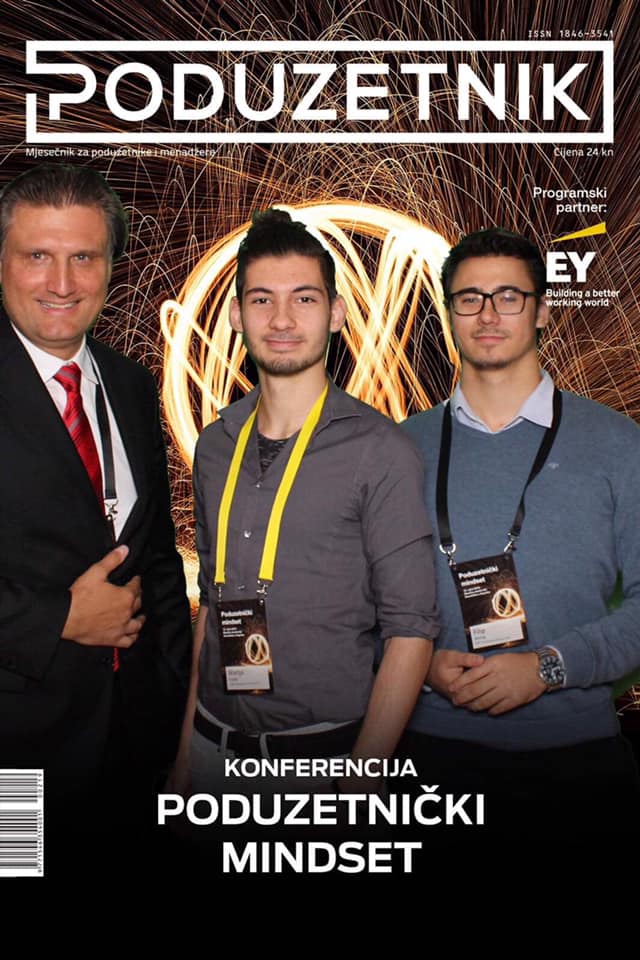
This focus on youth and the need to educate and encourage the next generation in entrepreneurial ways was a core them of the day. Speakers were encouraged to talk of their failures and explain that rather than being a disaster, failure is a necessary step on the road to success, assuming one learns from those failings.
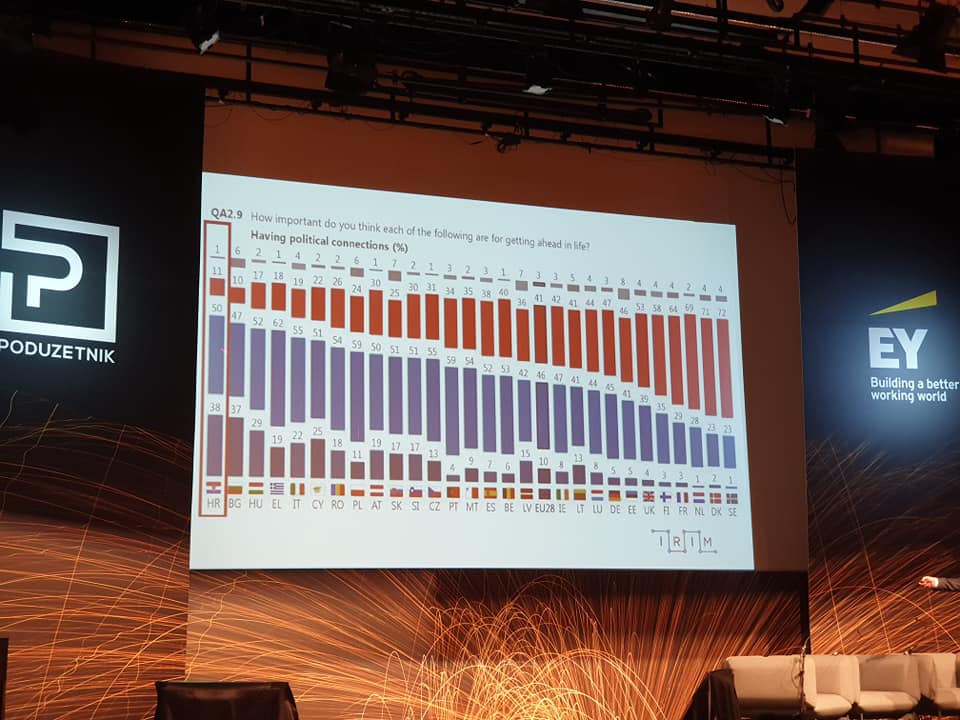
Nenad Bakic laid out the scale of the problem in a few simple slides on perceptions of EU citizens.
How important do you think having political connections is in getting ahead in life? Croatia tops the EU!
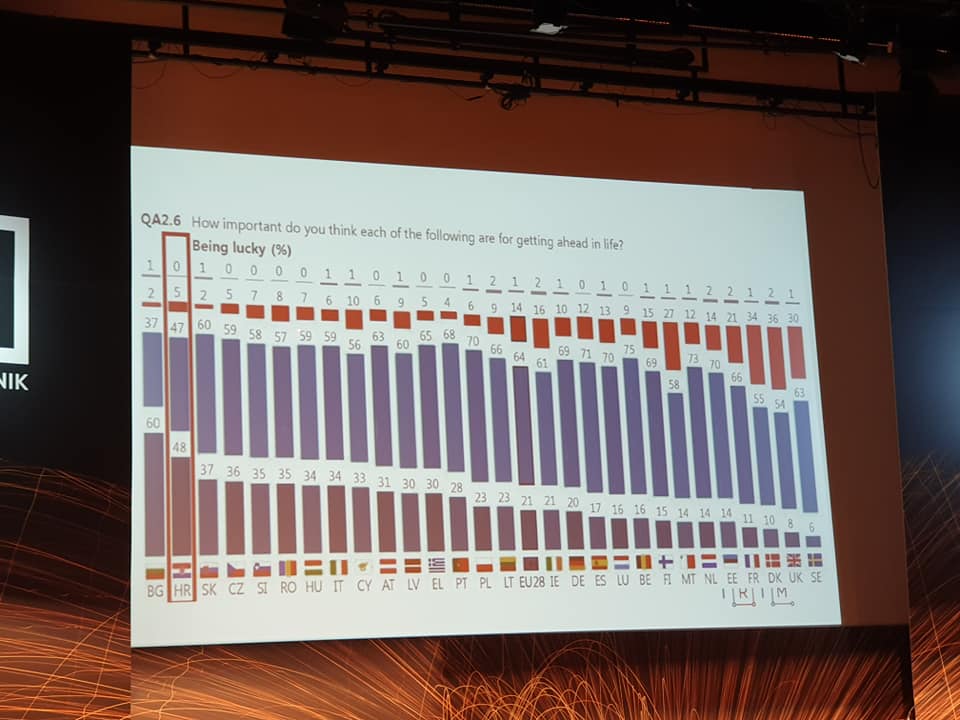
How important is being lucky to getting ahead in life? Only Bulgaria feels the luck factor more.
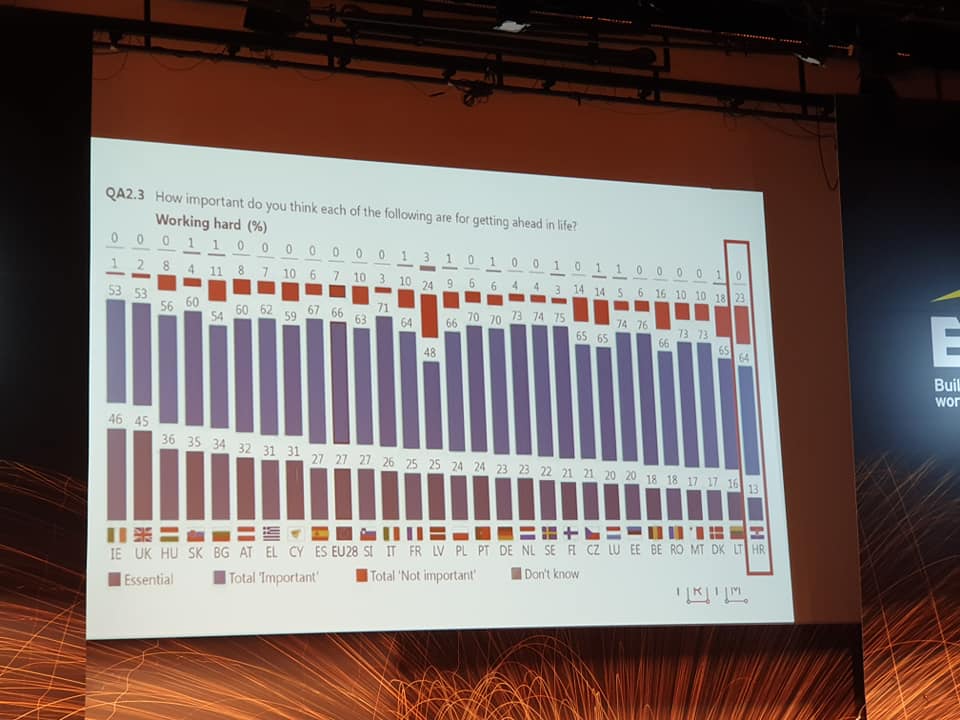
But when it comes to the importance of working hard, Croatia is bottom of the league.
By contrast, Luka Abrus from Five told the conference that 'I find that the harder I work, the luckier I get.'
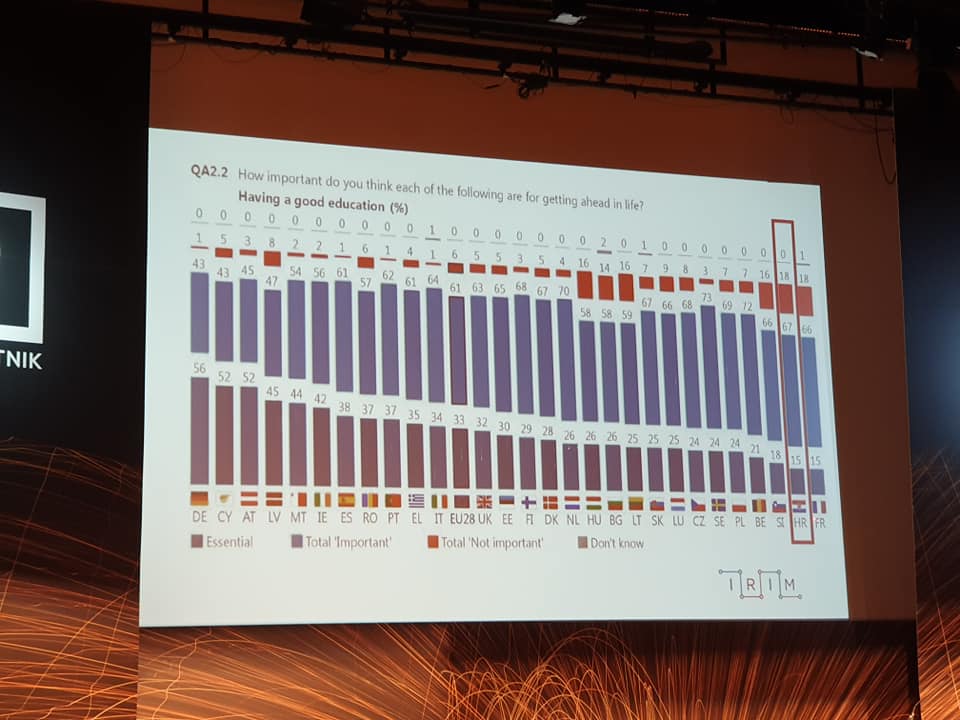
Along with working hard, the importance of education is not highly valued in Croatia, with only the French deeming it less important.
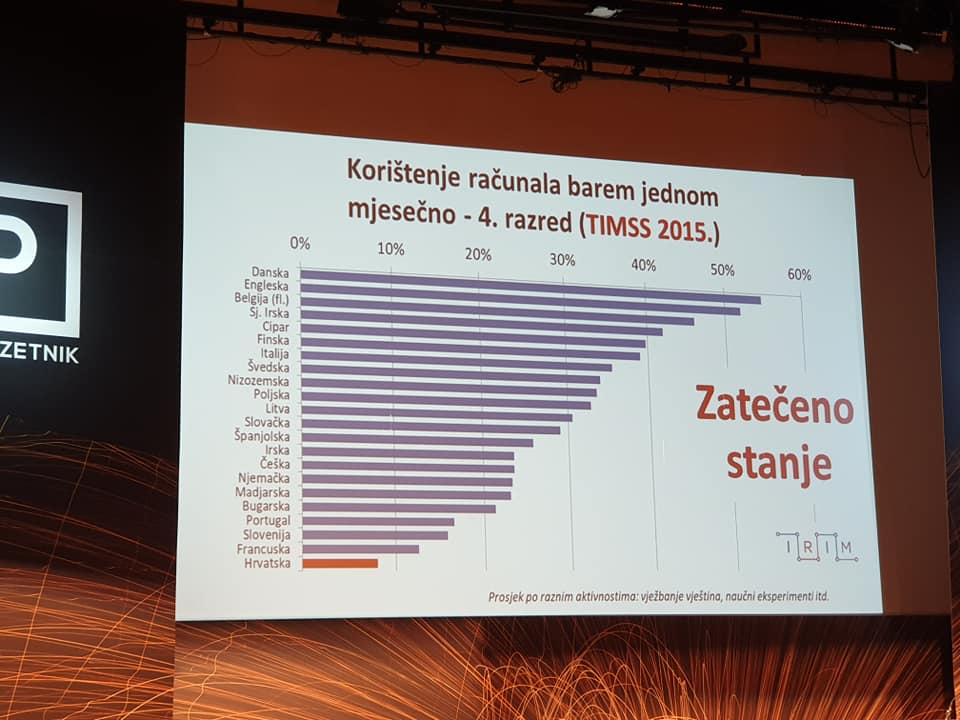
And when it comes to learning computer skills, Croatia is bottom again on the list of countries where kids in 4th grade use computers at least once a month.
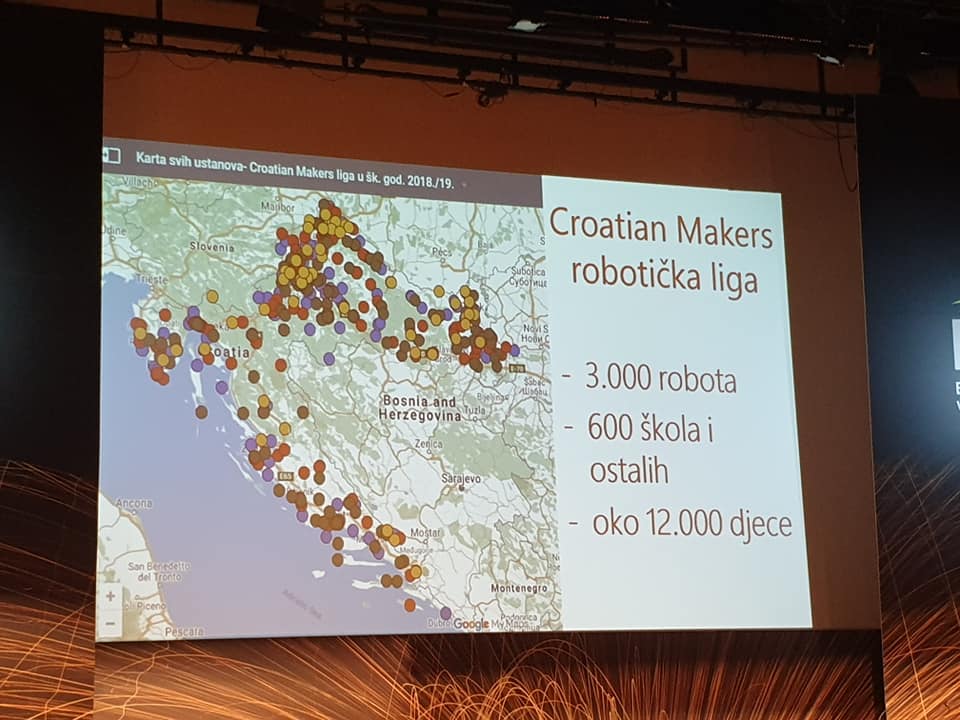
Some of the key messages of yesterday's conference were the need to share success strories to help potential entrepreneurs see that there is another way, to share and celebrate failures as a necessary path on the road to success, and to focus on education, education, education. Nobody is doing more in that regard than Nenad and Rujana Bakic with their STEM Revolution and Robotics League, which is already reaching a majority of schools in Croatia. I have written about this before, so click here to learn more.
The conference was a sell-out with a waiting list of over 200 people, and there was a great atmosphere as entrepreneur after entrepreneur took the stage to tell their stories and share their know-how. One of the most eagerly awaited presentations was from Mate Rimac, whose meteoric rise in just a few years has made him a global icon in the car industry.
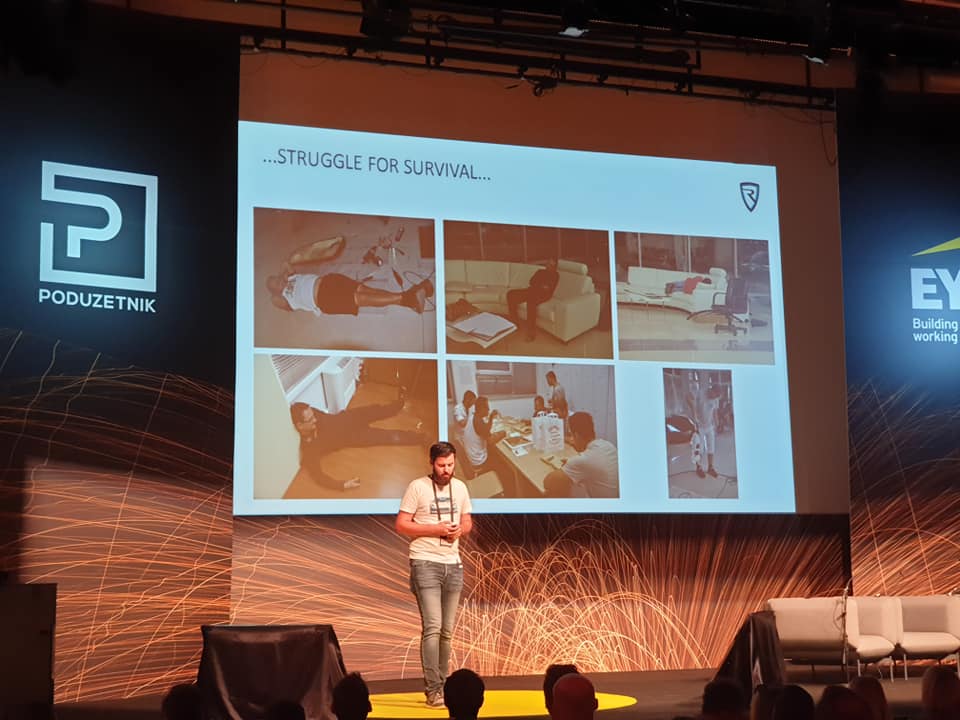
It was only a few years ago that those passionate early pioneers at Rimac Automobili were sleeping on the floor...
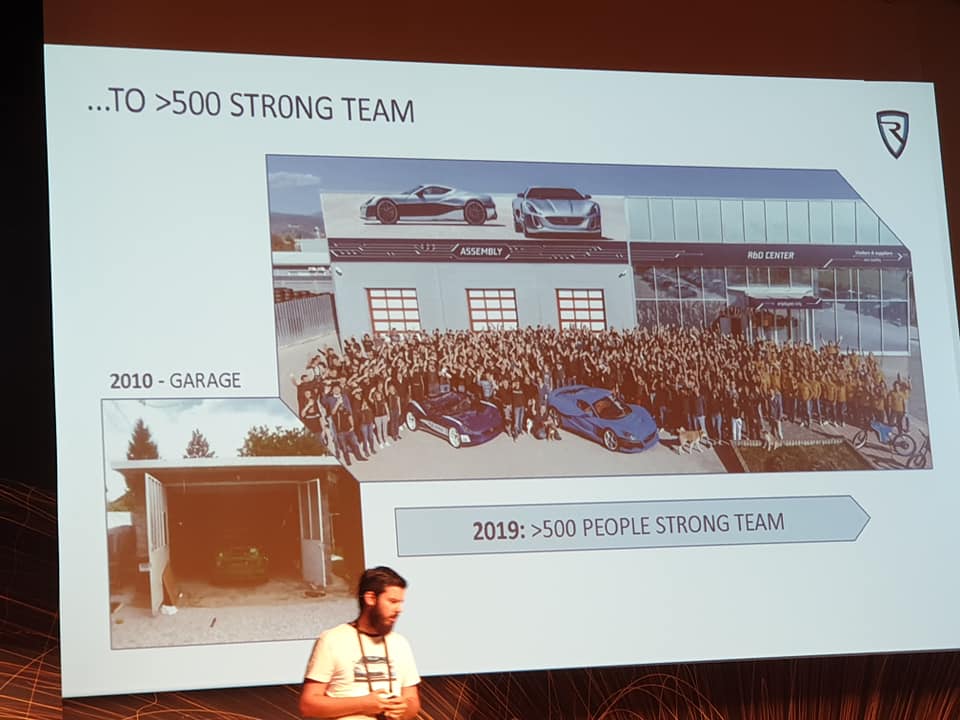
From 2010 to 2019.
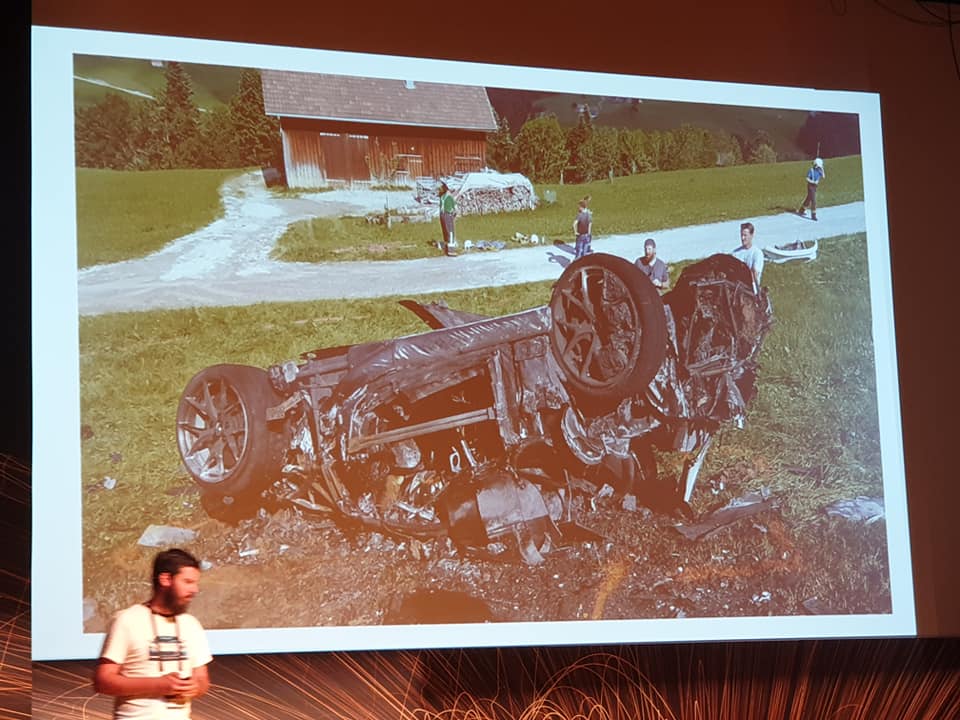
There were many highlights along the way, as well as THAT Richard Hammond crash, during which Rimac told the audience he aged 10 years.
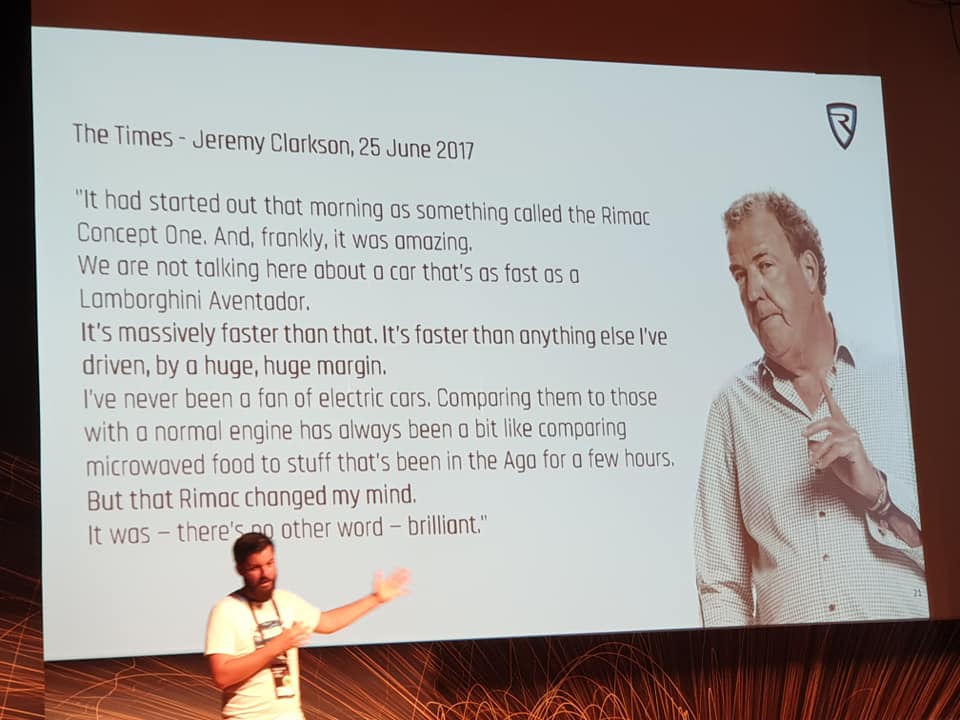
But of the many positives, there can be few more important endorsements than this.
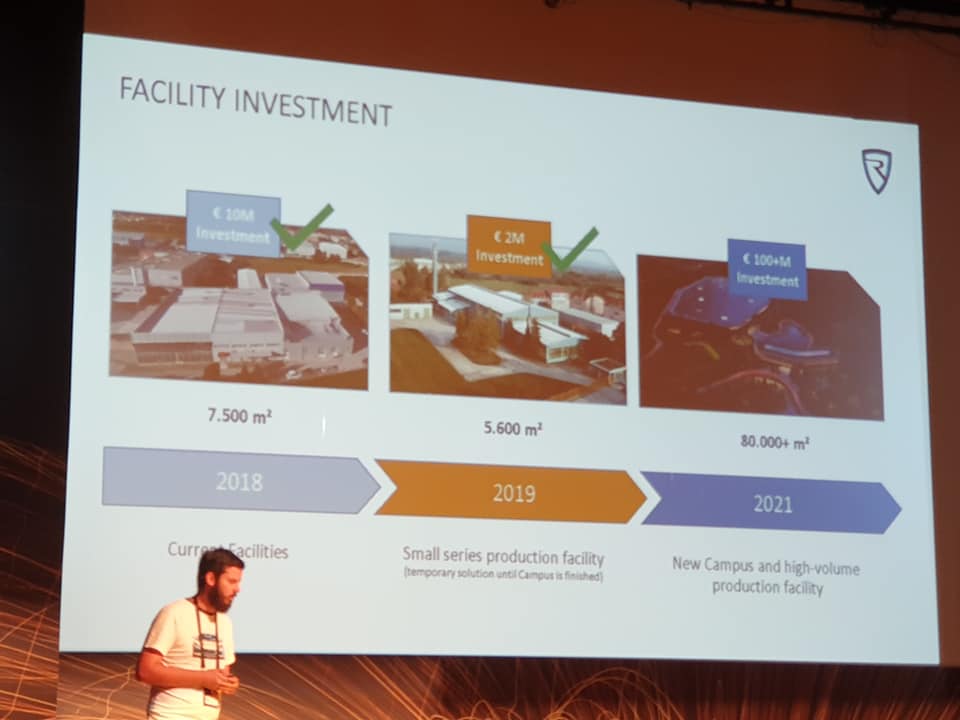
I have meet Rimac a few times, but this was the first time I had heard him speak about his business. What was impressive was his focus, and not on what he had achieved, but where he was going. A fabulous contribution to this most inspiring of days. I will do a feature later on his comparison of Craotia and Slovakia and the potential of a car industry - it was seriously interesting.
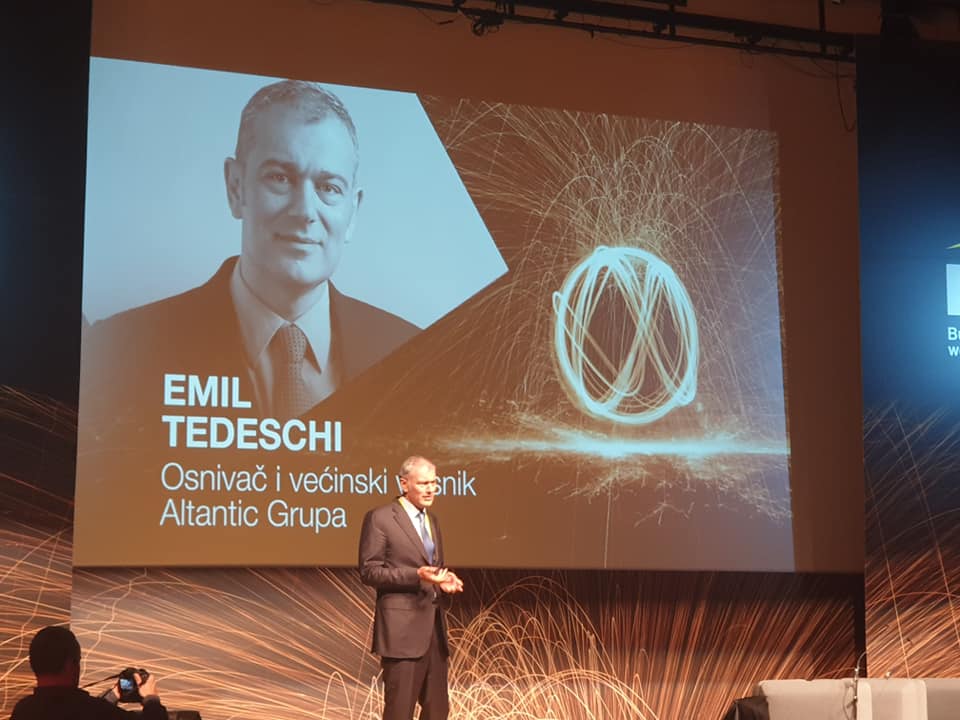
There were no prizes for guessing which speech caused the most waves. Atlantic Grupa CEO Emil Tedeschi was on the homepage of most Croatian news portals within hours of his speech after a typically forthright presentation. You can read more about the reaction here.
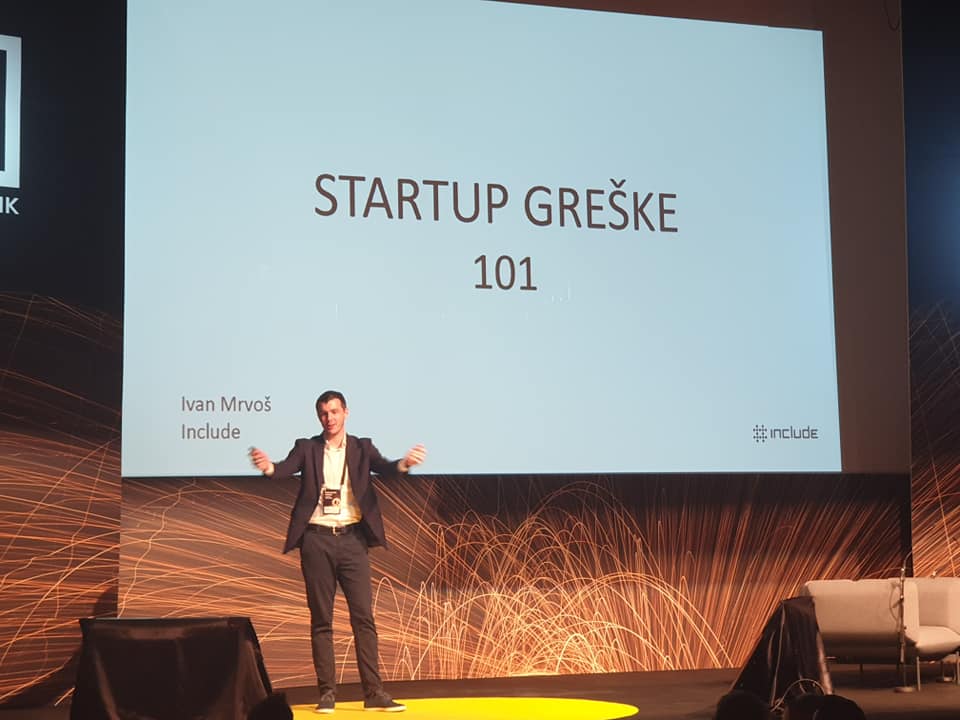
The youngest entrepreneur on the stage, 24-year-old Ivan Mrvos from Solin, attracting the most audience participation, who gave a brilliant overview of Startup Mistakes 101.
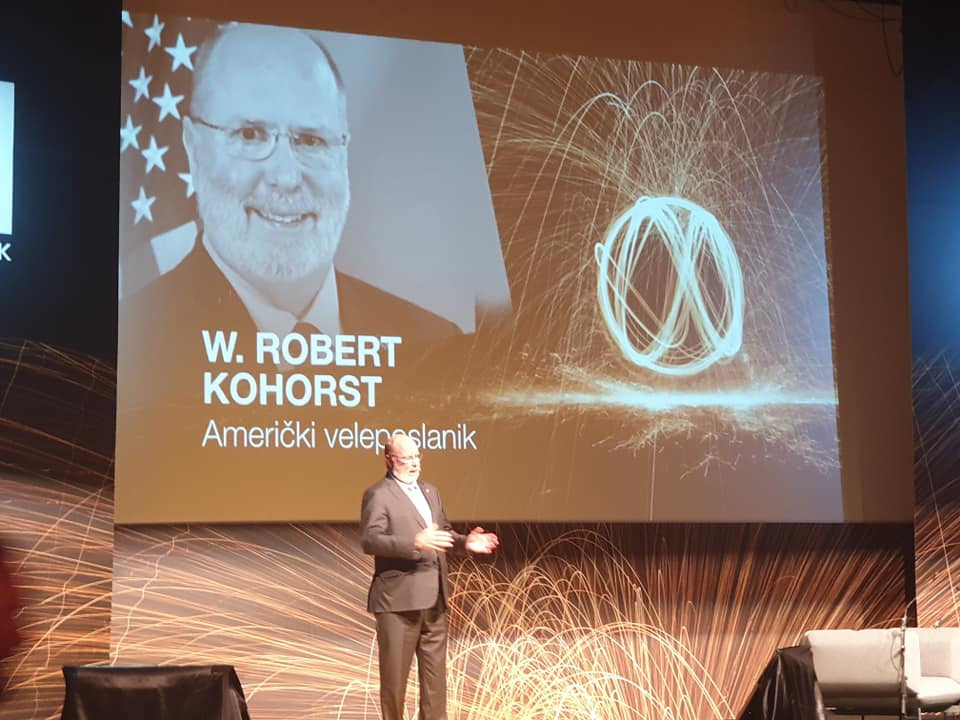
Croatia's entrepreneurs have been strongly supported by US Ambassador Robert Kohorst in the past, and Kohorst was a keynote speaker taking about his own entrepreneurial journey before joining the diplomatic corps, including his biggest failure, a $4 million investment into an online vetinerary business.
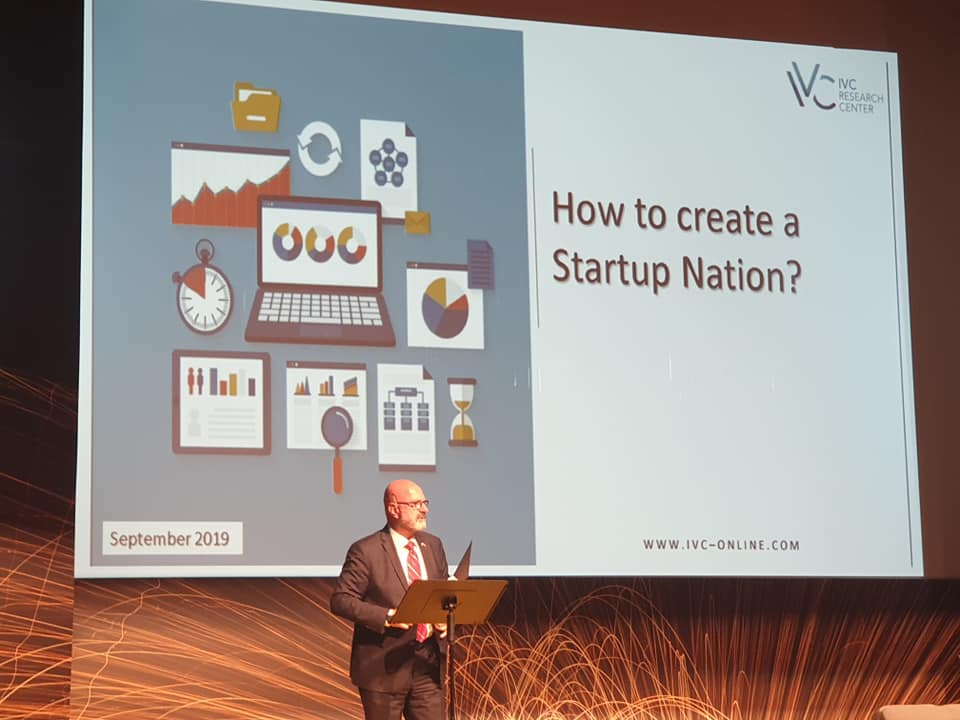
Kohorst was not the only ambassador to address the audience. Israeli Ambassador Ilan Mor talked about the Israeli experience and how to create a startup nation. With less than friendly neighbours and a culture of self-reliance, necessity had become the Israeli mother of invention.
The first Entrepreneurial Mindset conference was merely the start. In his closing remarks, Ognjen Bagatin announced that there would be four more conferences in the coming 12 months - in Osijek, Rijeka, Split and Zagreb - aimed specifically at encouraging entrepreneurial seeds in the next generation.
Mate Rimac presentation in full:
Nenad Bakic presentation in full:
You can see more of the conference presentations here.
To learn more about entrepreneurial intiatives in Croatia, follow the Casopis Poduzetnik Facebook page.
Meet some of the speakers at the conference in these TCN interviews over the past few days.
Entrepreneurial Mindset: Meet the Speakers - Matija Zulj
Continuing our look at the speakers for this week's inaugural Entrepreneurial Mindset conference in Zagreb on September 12, 2019. Next up, Matija Zulj from Agrivi.
It quickly sold out and there is a waiting list of hundreds should tickets become available. This week's Entrepreneurial Mindset conference in Zagreb is the first of its kind in Croatia, and it includes a top draw list of speakers, several of the most successful entrepreneurs in the country. TCN will be covering the event and we continue our series interviewing some of the key speakers. Our latest guest is Matija Zulj, the CEO and founder of Agrivi - a global farm management software company with a vision to change the way food is produced, positively impacting over a billion lives. Agrivi is one of the key global leaders in the industry - recognized by over 30 major industry market research companies and trusted by 40.000+ customers worldwide.
1. As a Brit, I notice that entrepreneurs are not embraced and supported as much in Croatia as they are in countries with a longer capitalist tradition. How does it feel being an entrepreneur here, and how did you decide to embark on this road less travelled?
Good ideas can be born anywhere in the world, and they are not fenced with the territory. Developing ideas and setting up goals does need a good environment, but each environment has its challenges. It is always great to think about learning points along the way and start doing, rather than just count barriers we see, or we have only heard about. When a person knows what are the dreams and wants to persuade them, one does not think how hard it will be, but put the right focus on the long-term vision and starts doing it day-by-day.
2. How would you compare the perception of an entrepreneur in Croatia to one in Germany or the USA, for example?
Starting points for entrepreneurs are quite different if we do compare these countries. The territory of Germany and the USA are big enough markets for any entrepreneur to check how valid the business model is and they can set operations focus only to that market to be successful. Croatia is a small country, so our entrepreneurs mostly think internationally to have a successful business. The big difference can be also seen in the number of funds that are allocated for entrepreneurs in countries and how easy/hard is possible to get it.
The existing eco-system is more ready to work closely and give more opportunities to startups in Germany and the USA. All these differences are here, maybe it looks harder in Croatia, but that has its charm and how much you can learn along the way.
3. Tell us about your entrepreneurial experience so far in Croatia - the highlights, the lows, the successes and the failures.
In Croatia, we have a lot of talented and inspirational people with an enormous passion for making this world a better place who will not find excuses, but rather make better opportunities with doing business. I think that is the best advantage for Croatia, you can easily get surrounded yourself with this kind of people who will keep you motivated even when it is hard. I do believe every entrepreneur anywhere focuses on positive things. Entrepreneurs create and set the climate and business area they like and believe it will make a positive impact on society. It is essential entrepreneurs take responsibility for their business and what values they set and which impact their business have in the environment it is operating.
4. What are your hopes for the conference and why did you decide to accept the invitation to speak?
The conference has a great purpose – to tell stories about entrepreneurship from the perspective of entrepreneurs. It is always great to be surrounded with mind-liked people, so I look forward to sharing and exchanging thoughts and experience with other entrepreneurs, no matter in which area they are operating, we have so much to learn from each other. I believe it is our responsibility as entrepreneurs to share our journey with each other and people who are thinking to take this career path to encourage them, and even students who are future entrepreneurs, simply to create a better environment for all of us.
5. Tell us a little about your own entrepreneurial mindset.
I always wanted to do something that will help others to have a better place to live in, that is why I have decided to pursue an entrepreneurial path and create a company that tackles one of the biggest global challenges. I believe it is important to surround yourself with great people and big talents, give them opportunities and learn from them. Mistakes will happen, failures will happen and it will happen a lot, so it is important to focus on learning points, rather than overthink situations why it happened.
The focus should be on daily execution with always knowing how it will help in achieving set goals. Share experiences, listen to other entrepreneurial paths that can only help in avoiding mistakes, making decisions and be quicker. Always remind yourself to enjoy the journey, no matter how hard or good it is in a single moment.
6. Instilling an entrepreneurial mindset into a society which has grown up with socialism will take some time and effort. What is the roadmap to achieve this?
We need to celebrate the successes of all entrepreneurs in the environment and encourage them along the way. Successes can be achieved, and those who get there should share experience and mentor new entrepreneurs.
7. What advice would you have for someone in Croatia thinking about taking the entrepreneurial route?
Don’t think, just start and enjoy the ride. It will be the best journey of your life.
8. Andrija Colak once told me that the best thing about doing business in Croatia is that if you can succeed here, you can succeed anywhere in the world. Do you agree, and why is it so hard to do business in Croatia?
Talking from the point of view of the small market with a specific history it surely represents a tougher challenge than starting on another market where all the environment has been set and runs smoothly. Challenges should be a great motivator for doing something new and good rather than something that will stop you from trying and doing.
9. How do you see the entrepreneurial scene in Croatia, and what changes have you noticed in the last ten years?
It is a great inspiration to see great companies in Croatia that have become true role models for other entrepreneurs. We could always look at how Infobip and Rimac Automobili did it, so if they can do great business here, we should find motivation in their success.
10. Three things you would like to see to help entrepreneurs in Croatia.
This is what I see as encouragement for entrepreneurs:
· Changing the mindset: celebrating failures as learning points & successes as encouraging points.
· Digitalization of administration: simpler and faster for running business operations.
· Sharing success entrepreneurial stories: creating more conferences, meetups and set an easy environment for talking about the entrepreneurial journey.
More info on the conference can be found at www.poduzetnickimindset.biz and FB Casopis poduzetnik.
Entrepreneurial Mindset: Meet the Speakers - Luka Abrus
September 10, 2019 - Continuing our look at the speakers for this week's inaugural Entrepreneurial Mindset conference in Zagreb on September 12. Next up, Luka Abrus from Five.
It quickly sold out and there is a waiting list of hundreds should tickets become available. This week's Entrepreneurial Mindset conference in Zagreb is the first of its kind in Croatia, and it includes a top draw list of speakers, several of the most successful entrepreneurs in the country. TCN will be covering the event and we continue our series interviewing some of the key speakers. Our latest guest is Luka Abrus, CEO and co-owner of Five, a mobile design and development agency building award-winning digital products that generate returns for our clients, with a 180 people team..
1. As a Brit, I notice that entrepreneurs are not embraced and supported as much in Croatia as they are in countries with a longer capitalist tradition. How does it feel being an entrepreneur here, and how did you decide to embark on this road less travelled?
I'm a part of the younger generation (not necessarily by age anymore, but I still feel like it), that hasn't been burdened by socialism and cultural self-imposed limitations. And I've grown up in the IT sector, which has been a global industry from the start. Since an early age I was looking at software giants build their global scalable companies, so for me there was no other way. I'd say IT is specific, especially new IT companies started in the last 10-15 years, as they are inherently oriented towards export and building global products and identity.
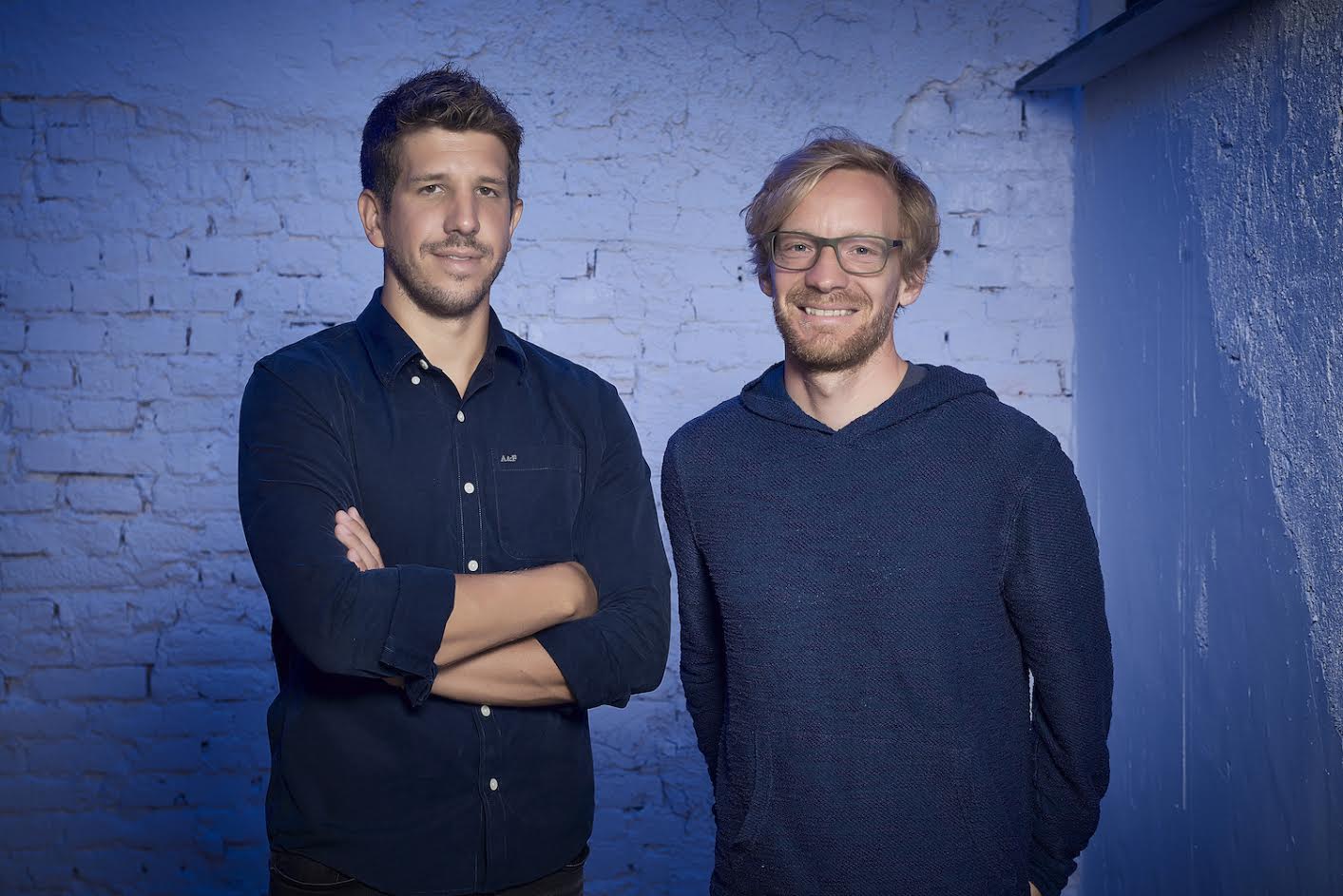
(Luka Abrus with partner Viktor Marohnic, right)
2. How would you compare the perception of an entrepreneur in Croatia to one in Germany or the USA, for example?
Well, I live in a bubble. I'm surrounded by positive stories, globally successful people, fellow entrepreneurs, self-employed consultants, and in general people who understand what creating value means. Over the past 10 years of my entrepreneurial career I've seen a shift towards a more positive attitude to entrepreneurs. And especially in the light of the emmigration happening in the last few years, people are now paying more attention to individuals and companies creating value out of nothing and who are keeping people well-paid, professionally growing, and ultimately happy in Croatia.
What I think we still miss is more understanding and support for failures. I've seen a few examples of companies experiencing a downturn, and people still don't realize it's all part of the circle of life, and actually an extraordinary experience to learn from.
3. Tell us about your entrepreneurial experience so far in Croatia - the highlights, the lows, the successes and the failures.
To be frank, my experience as an entrepreneur in Croatia has been perfect. But the main reason is that I really pay no attention to the bureaucracy, formalities, paperwork or any other imposed burden. I find myself lucky to have great people inside and outside of the company who take care of that, so I can focus on building the business. I'm actually being selfish in a way, as I'm doing only the things I actually love and enjoy.
100% of our business is in the US, we have no clients in Croatia, and that was, obviously, a deliberate move. So we operate more as a US company building our global brand. I still can't understand how there's no bigger strategy and long-term picture with legislators (a good example is the regulation around flat-rate crafts, or "paušalni obrt", which is a really complex topic with many sides and numerous benefits and disadvantages to all parties on whole market). But I choose not to lose sleep over it - it's simply a playground we operate in, and we play by the rules and do our best. Though I wish there were more courageous moves being taken, such as changing (or eliminating?) the income tax, improving (or loosening?) the Labour law, etc.
4. What are your hopes for the conference and why did you decide to accept the invitation to speak?
It's a clear opportunity to learn and get reinvigorated by the energy of other entrepreneurs. For myself, my speech will be the lowlight, as I can't learn from myself :) And I'm really looking forward to hearing other ideas, stories and visions, and just hang out with great folks.
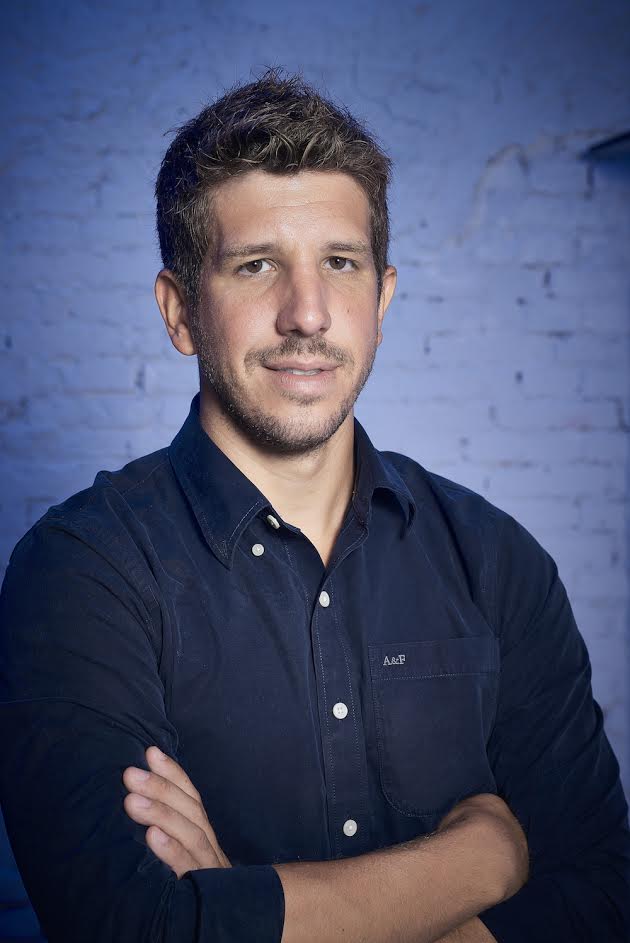
5. Tell us a little about your own entrepreneurial mindset.
I feel confident taking risks, and I understand it's a marathon, and endurance is the key skill. There is a term I recently learned while sailing - art of marginal improvements. And that's exactly it, after you set the right vision and long-term strategy, it's about making sure each day we move one step ahead, no matter how small. Being completely focused, never letting go of the tiller or sails, and fighting for each incremental improvement. And it works, when I look at where we've been 5 or 10 years ago and compare it to now, there has been a handful of visionary strategic decisions, and everything else was just making sure we win our daily battles and move forward.
6. Instilling an entrepreneurial mindset into a society which has grown up with socialism will take some time and effort. What is the roadmap to achieve this?
I believe it's two things - first is giving more spotlight to successful entrepreneurs, and indirectly showing that there are people who became successful on the market just with their skills and knowledge. We simply need more success stories, from people who have no political background. We already have a few, and I'm very excited to see them grow even further, and change our landscape before our eyes - Infobip, Nanobit, Rimac.
And the other is changing the system, on both the educational front but also the judiciary. This transition will take much longer, and the system is too stiff and not keen to change. But, small steps, marginal improvements, let's take our battles one by one, as I lost hope for a visionary revolution.
7. What advice would you have for someone in Croatia thinking about taking the entrepreneurial route?
Do it now, and focus solely on exporting your services, products, knowledge. Travel, and feel confident with failing, because everyone else is probably expecting you to. Think big and find the right role models to look up to.
8. Andrija Colak once told me that the best thing about doing business in Croatia is that if you can succeed here, you can succeed anywhere in the world. Do you agree, and why is it so hard to do business in Croatia?
Well, I've heard stories, but again, doing IT is a bit different than all other verticals. We invest in people capital, and do not need large upfront investments, do not deal with a lot of bureaucracy or real estate. I'd say every business is hard and challenging, but that's where the reward lies.
9. Three things you would like to see to help entrepreneurs in Croatia.
a - More Infobips, Nanobits and Rimacs (and Fives!) to lead the way.
b - Visionary government ready to make changes over a decade, resistant to populism.
c - More events like this, where entrepreneurs are ready and willing to share their knowledge, understanding we're not competitors, but tiny grains of sand on the global market.
I'd settle with 2 out of 3 for now, obviously. :)
More info on the conference can be found at www.poduzetnickimindset.biz and FB Casopis poduzetnik.
Croatia Airlines Makes Changes to Operations this Winter
September 10, 2019 - As the summer season comes to an end, we look ahead to the winter in Croatia. Thus, Croatia Airlines has announced some small changes to its flight schedule this year.
Recall, Croatia will assume the Presidency of the Council of the European Union from January 1, 2020. With that said, Ex Yu Aviation reports that the national carrier will add a one flight per week between Brussels and Zagreb, totaling to 12 per week. Furthermore, the seasonal service between Zagreb and Dublin will work until January 26, 2020, while its operations between Zagreb and Lisbon will end at the end of October.
Croatia Airlines will maintain the same winter operations for other Croatian cities this year, which include flights from Split to Frankfurt, Munich and Rome, Dubrovnik to Frankfurt, and Rijeka to Munich. Croatia Airlines has also announced no changes to its winter operations between Croatian locations.
Recall, Croatia Airlines is currently undergoing a privatization process, which the Croatian Minister for Sea, Transport and Infrastructure, Oleg Butković, previously said should be completed by the end of the year. “I believe we will deliver within the set timeframe,” the Minister said. Privredna banka Zagreb (PBZ) and Germany's DVB Bank are advising the airline in the process.
While the national carrier projects a 5% increase in passenger traffic by the end of 2019, there are no plans to make any significant changes to its services until the privatization process is complete.
Ex Yu Aviation adds that Croatia Airlines even dropped its plans to extend the wet-lease for one of Air Nostrum's Bombardier CRJ1000 jets into the winter months, which would have lengthened some of its seasonal routes. Croatia Airlines currently maintains twelve routes from Zagreb during the summer.
Croatia Airlines has welcomed 960,620 passengers from January to June this year, which is an increase of 1.2% compared to 2018.
To read more about travel in Croatia, follow TCN’s dedicated page.
Croatia to Join in Marking World Suicide Prevention Day on Tuesday
ZAGREB, September 10, 2019 - According to data provided by the Interior Ministry, 657 Croatians committed suicide in 2018, which was a 5.1 per cent rise compared to 2017.
Broken down by gender, 156 women and 501 men killed themselves last year in Croatia. A very alarming fact is that the number of deaths by suicide in the age cohort under 25 years increased by 45% to 48 cases in 2018 as against 33 in 2017.
These figures were presented in a press release on Monday by the no-profit making association called "Životna Linija" which will organise the lighting of lanterns along Savski Most bridge in Zagreb on Tuesday, 10 September, when World Suicide Prevention Day is observed worldwide.
The lantern-lighting ceremony in Zagreb will be staged in memory of suicide victims in Croatia.
The NGO is also preparing a concert to be held in the Sax Club in Zagreb on 10 October, when World Mental Health Day is observed.
More health news can be found in the Lifestyle section.

